
84 minute read
Page 17
Continued from page 5
old daughter was rather mischevous and naughty, something she enjoyed, but sometimes her patience is tested with her child. She wanted guidance on how to handle the situation.
Huzooraa said:
“It’s a good thing, let her be naughty – [children] who are naughty are intelligent … Whether you enjoy it or not, you must not show anger ... [When your patience is tested] Tell her that you are tired and to let you rest for some time and that you will talk and play later. Children are intelligent, they do understand … do her tarbiyat but do not show anger, do not tell her off and do not say anything negative to her.”
Dr Humda Sahiba confi rmed she would act on Huzoor’s advice and asked if there was any prayer she could recite. Huzooraa advised to recite durood sharif.
A young waqifa-e-nau, Sadia Mahboob Sahiba, asked Huzooraa when he would visit Bangladesh. With a smile, Huzooraa said that he would visit when the conditions permitted and that currently, the clerics of Bangladesh had created adverse conditions. Huzooraa said, “Pray that the condition improves quickly for me to visit Bangladesh and I can meet you in Bangladesh.”
Amatun Noor Ruhi Sahiba asked Huzooraa who else supported and helped him, apart from Allah, during his Khilafat.
With a smile, Huzooraa immediately said:
Another waqifa-e-nau asked Huzooraa if it was permissible to say “Inna lillahi wa inna ilaihi raji‘un” (Surely to Allah we belong and to Him shall we return) when a non-Muslim dies.
Huzooraa said:
Huzooraa explained that we could say this Quranic verse even if that person was from the wrong religion as their aff air was now with Allah. “When we say ‘Inna lillahi wa inna ilaihi raji‘un’, it means that was a loss for that person’s family, but at the same time, we are also thankful that Allah the Almighty has saved us from the wrong religion and we are blessed that Allah has made us accept the true religion.
Upon this, the time had ended, and the questions also ended.
Hazrat Amirul Momineenaa ended the meeting by giving the following prayer to all the waqifeen-e-nau:
“May Allah the Almighty protect you and keep you safe and as waqifaat-e-nau, may you all come to fulfi l the true purpose and objectives of the dedication of your lives for the sake of your faith and be those who protect and nurture the future generation in the best way.
“May a pious Ahmadi Muslim generation be born and raised through you and may they become those who carry forth the propagation of the Ahmadiyya Muslim Jamaat and spread its message in Bangladesh.
May Allah fulfi l all of Huzoor’s prayers in favour of Waqf-e-Nau Bangladesh and each and every one of us. Amin.
9 February 1891: The Promised Messiahas wrote a letter to Hazrat Hakim Maulvi Nuruddinra in which he stated that he had received an ishtihar (announcement) from Mian Abdul Haq Sahib Ghazanvi mentioning his (Mian Abdul Haq) revelations that suggested the Promised Messiahas was hell-bound and would be thrown into hell, God forbid.
Huzooras said that it seemed he had distributed many copies of the ishtihar in Amritsar. Hazrat Ahmadas added that it appeared as though the ishtihar was from Maulvi Abdul Jabbar Sahib, but he had published it in his student’s name and requested for a mubahala (prayer duel) as well. The Promised Messiahas further said that Maulvi Muhammad Hussain Batalwi had also sent a letter and asked whether he (Hazrat Ahmadas) had claimed to be the Promised Messiah. To this, Huzooras replied in the affi rmative. (Maktubat-eAhmad, Vol. 2, pp. 102-103) 10 February 1900: During the ongoing war in South Africa, English forces were in great diffi culty against the local Boer commandos. Owing to the circumstances, the Promised Messiahas, on this date, issued an appeal for funds to help the orphans, widows and wounded of the war and 500 rupees were immediately collected and sent to the chief secretary to the Punjab Government and later, the lieutenant governor thanked the Promised Messiahas for this donation on behalf of the government. (Life of Ahmad by AR Dardra [2008 edition], pp. 720-721) 10 February 1900: On this date, the Promised Messiahas published an ishtihar, titled, An Important Announcement for This Jamaat in which he stated that as Muslims of India were the recipients of many favours of the British government, Muslims should show their gratitude towards this kind government. Huzooras stated that he had delivered a speech on the occasion of Eid-ul-Fitr in which he enumerated the favours of the British government and prayed for the British victory in the Transvaal War. (Majmua Ishtiharat, Vol. 3, pp. 1-2) 10 February 1907: On this date, the Promised Messiahas received a letter sent by a manager of a gurukula (traditional Hindu educational institute) in Gujranwala. Malfuzat, volume 5 (p. 145) indicates that on behalf of the Promised Messiahas, Hazrat Mufti Muhammad Sadiqra sent a reply to this letter on 17 February, in which there was an exchange of views regarding the schedule of a prearranged lecture that was to be delivered by Jamaat-e-Ahmadiyya. 10 February 1908: The Promised Messiahas wrote a letter to Hazrat Mian Abdul Majeed Khanra saying that he had been unwell for almost 20 days and was suffering from a severe cough. Hazrat Ahmadas said, alluding to his frail health, that he was unable to fully focus on prayers and added that at times, it proved diffi cult to respond to letters. (Maktubat-e-Ahmad, Vol. 3, p. 79) 11 February 1886: The Promised Messiahas wrote a letter to Hazrat Munshi Rustam Alira in which he stated that he had not intended to go to Jalandhar and that this news was false. Huzooras added that he was not sure how long he would remain in Hoshiarpur and said that these matters were in the hands of Allah. (Maktubat-eAhmad, Vol. 2, p. 470) 11 February 1891: The Promised Messiahas wrote a letter to Maulvi Abdul Jabbar Ghazanvi, in which he stated that he had received an ishtihar from a person named Abdul Haq challenging Huzooras for a mubahala (prayer duel). The Promised Messiahas added that as he was unaware whether this person was a follower of a group or of a certain leader, he (Huzooras) wrote this letter, addressing Maulvi Abdul Jabbar Ghazanvi, with the thought that the person who had sent the ishtihar was from his (Maulvi Abdul Jabbar Ghazanvi’s) Jamaat. Huzooras further wrote that he had no objection over the mubahala and added that it was true that he had claimed to be the Latter-Day Messiah whose coming was foretold. (Maktubat-e-Ahmad, Vol. 1, pp. 424-428) 11 February 1905: Maulvi Ahmad Saeed Ansari Sahib, a relative of Hazrat Pir Siraj-ul-Haq Numanira, arrived in Qadian and had the honour of meeting the Promised Messiahas. (Mafuzat, Vol. 4, pp. 229-230)
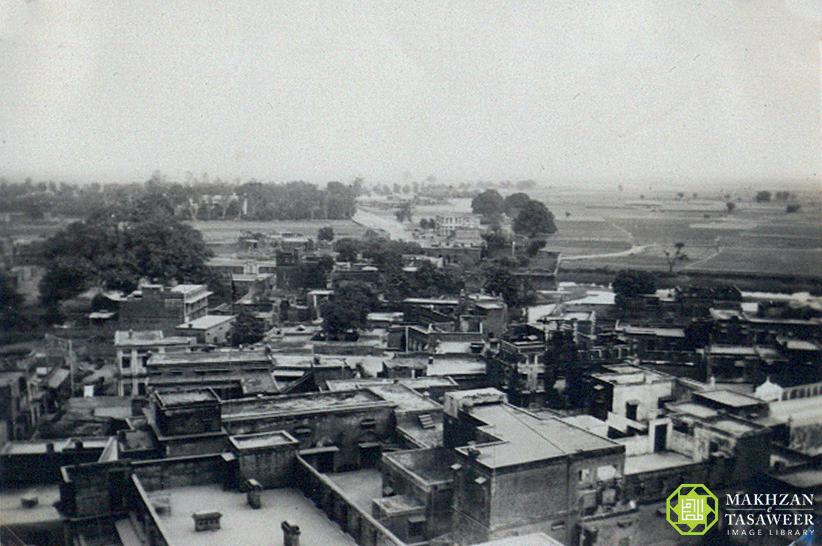
Answers to everyday issues
Part VIII
Guidance regarding basic Islamic issues – which Hazrat Amirul Momineen, Khalifatul Masih Vaa has given at various occasions in his written correspondence and during MTA programmes – is being officially published below for everyone’s benefit.
Zaheer Ahmad Khan Head of Records Department, Private Secretariat, London
The age of Hazrat Aishara at the time of her marriage
In an official mulaqat on 13 December 2020, Huzooraa reflected upon various narrations and looked at the sayings of the Promised Messiahas regarding the age of Hazrat Aishara at the time of her marriage to the Holy Prophetsa and gave the following guidance on this issue:
“We find a great deal of discrepancy in the books of history, sirah, tafsir and hadith regarding the age of Hazrat Aishara at the time of her marriage to the Holy Prophetsa . The age of Hazrat Aishara at the time of her nikah to the Holy Prophetsa that has been mentioned in these books ranges from six to 16 years, while her age at the time of her rukhsati [sending off] mentioned in them ranges from nine to 19 years.
“Narrations of the Sihah al-Sittah [the six authentic books of hadith], including those of Sahih al-Bukhari, mention the age of Hazrat Aishara at the time of her nikah as being six years and her age at the time of the consummation of the marriage as nine years. However, if we scrutinise these narrations regarding the age of Hazrat Aishara on the basis of the principles of the science of hadith – i.e. riyawah and dirayah – we find them falling short of the standard of authenticity.
“21 of the narrations in this regard are reported in the Sihah al-Sittah, 14 of which are narrated by Hisham ibn Urwah and the others by Abu Ubaidah, Abu Salamah and Aswad. It is strange indeed that this very significant and important incident, in terms of history and sirah, has not been narrated by any of the most prominent sahabah.
“The narrations regarding Hazrat Aisha’sra marriage at a young age first came to light in 185 AH, when some considerable time had passed after the demise of Hisham and Urwah, the two narrators who have narrated most of the ahadith in this regard. Moreover, Hisham and Urwah spent most of their lives in Medina and Imam Malikrh , the renowned muhaddith of Medina, was an acclaimed pupil of Hisham ibn Urwah. Despite all this, there is no mention of this narration in Muwatta of Imam Malikra .
“Towards the end of his life – when Hisham ibn Urwah had lost his eyesight, his memory had deteriorated and (according to experts of biographical evaluation) he had started to suffer from delusion and amnesia – he emigrated to Kufa and it is there that he mentioned this narration for the first time. The person to whom he narrated it, also let another 40 years pass after the demise of Hisham ibn Urwah before he narrated it further. So, there was no possibility of finding any evidence in favour of it or against it.
“Thus, the fact that Hisham did not report this narration as long as he lived at Medina and that it was mentioned in a book which was compiled many years after his demise, casts various doubts on its authenticity. There is also a possibility that this narration was fabricated in order to slander the family of the Holy Prophetsa in general and Hazrat Aisha Siddiqara in particular. It may have been done to prove that, although the Holy Prophetsa had instructed to learn half the faith from this wife, one could not learn about the faith at all from her since she was married to the Holy Prophetsa at a young age when she still used to play with other girls and with dolls and the Holy Prophetsa passed away while she was still in her childhood.
“Moreover, there is a discrepancy within the narrations of Sahih Bukhari regarding the nikah of Hazrat Aishara. In one of the narrations, Hazrat Aishara states that the Holy Prophetsa married her three years after the demise of Hazrat Khadijara, while in another narration it is written that Hazrat Khadijara passed away three years before the migration of the Holy Prophetsa to Medina and that he then waited for two years or very close to this period before performing the nikah with Hazrat Aishara .
“Thus, although the collectors of ahadith have performed their task with the utmost care, there still remains an aspect of error, doubt and suspicion because it was approximately 100 to 150 years after the Holy Prophetsa that the ahadith started to be compiled while Muslims had become divided into several sects and various kinds of disagreements had grown among them.
“Thus, in addition to the reform and resolution of other issues, the Hakam and Adl [judge and arbiter] of this age, the Promised Messiahas has also resolved the issue at hand in the most excellent manner.
“Huzooras states:
‘Although we hold the most courteous view towards ahadith, but how can we accept a hadith that is contrary to the Noble Quran or against the honour of the Holy Prophetsa? That was the time of collecting and compiling the ahadith and although those people compiled the ahadith after much scrutiny, they were unable to take complete and absolute care in this regard. That was the time for collecting, but now is the time for review, scrutiny and contemplation.’ (Malfuzat, Volume 9, Vol. 9, pp. 471-472 [1984 edition])
“If we analyse the issue of the age of Hazrat Aishara from another angle, we learn from the books of history and sirah that all four children of Hazrat Abu Bakr Siddiqra (i.e. Hazrat Abdullahra, Hazrat Asmaara , Hazrat Abdur Rahmanra and Hazrat Aishara) were born before the Holy Prophetsa was formally commissioned by God. Hazrat Aishara is also included among the list of the early Muslims drawn up by biographers. How could the name of Hazrat Aishara be included among the list of early Muslims if she was born in the fifth year after the formal commissioning of the Holy Prophetsa?
“Historians have written that Hazrat Asmaara was 10 years older than Hazrat Aishara and that at the time of the Hijrah, Hazrat Asmaa was 27 years old. According to this, Hazrat Aishara would have been born in the fourth year before the formal commissioning of the Holy Prophetsa. And if we assume that her nikah took place before the Hijrah, then she would have been 14 at that time.
“There is a narration in Sahih Bukhari regarding the Battle of Uhud, which was fought in 2 AH. According to the narration, Hazrat Aisha bint Abu Bakrra and Hazrat Umm Sulaimra used to fill up waterskins and carry them on their backs to the people to provide them water. If Hazrat Aishara had been as young as a small girl, then how was she able to run around on the battlefield carrying filled up waterskins on her back to take them to the injured? How was she able to perform this duty?
“Hence, this also proves that in 2 AH she was certainly old enough to be able to perform such a strenuous task on the battlefield.
“This fact has also been recorded in history books that before her marriage to the Holy Prophetsa, Hazrat Aishara was engaged to Jubair ibn Mut‘im. Her engagement at that time also tells that she was not six years old. This is especially due to the fact that when the Holy Prophetsa asked Hazrat Abu Bakrra for Hazrat Aisha’s hand in marriage, [prior to that] Hazrat Abu Bakrra had asked Jubair ibn Mut‘im for the rukhsati of Hazrat Aishara. When he received a rejection from him, the engagement was annulled. It was then that the nikah with the Holy Prophetsa took place. Hazrat Abu Bakr Siddiq’sra requesting Jubair ibn Mut‘im for the rukhsati proves that Hazrat Aishara was not at all six years of age at that time. Even at that time, she had reached a marriageable age.
“The conclusion to which Hazrat Musleh-e-Maudra came after carefully analysing the narrations on the age of Hazrat Aishara in his scholarly manner, is that her age at the time of her marriage was 13 to 14 years. That indeed is the correct estimation of her age. Accordingly, the age of Hazrat Aishara at the time of the Holy Prophet’ssa demise was 21 to 22 years, which is the most excellent age for the completion of the acquisition of religious knowledge and for imparting it further to other people.
“The Hakam and Adl of this age, the Promised Messiahas, has completely rejected the narrations which state the age of Hazrat Aishara as being nine years at the time of her marriage to the Holy Prophetsa. Thus, the Promised Messiahsa, while replying to the allegations raised by Fath-e-Masih, a Christian priest and an opponent of Islam,
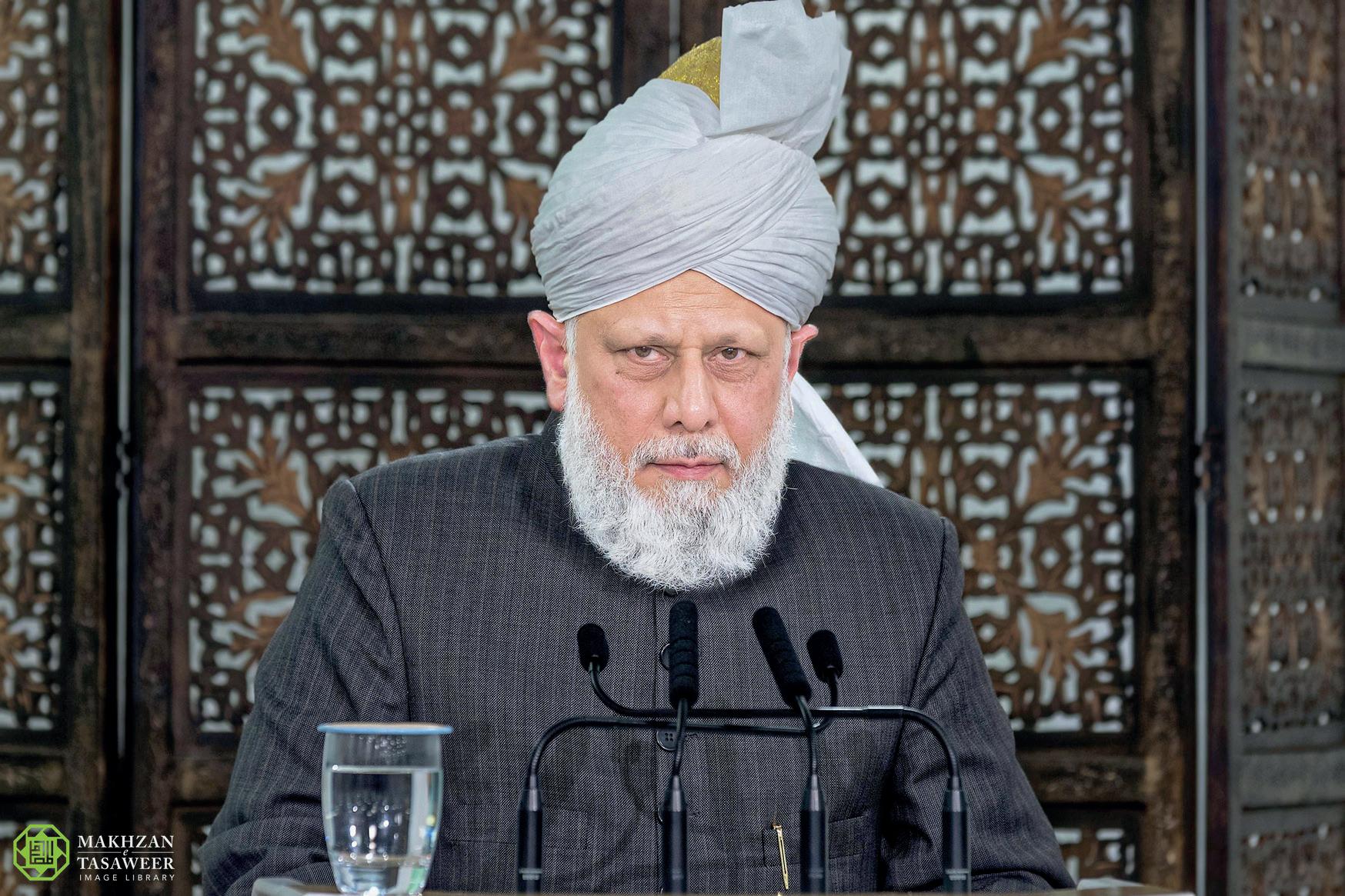
said:
‘You have written about the formal wedding of Hazrat Aisha Siddiqara as having taken place at the age of nine years. Firstly, it is not proven that the Holy Prophetsa himself ever mentioned “nine years”. Neither was there any revelation about it, nor is the age of nine years definitively proven by mass-transmitted narrations [akhbar mutawatirah]. It has just been taken from a narrator.’ (Nur-ul-Quran No. 2, Ruhani Khazain, Vol. 9, p. 377)
“Likewise, on another occasion, Huzooras said:
‘Hazrat Aisha’sra being nine years old is only mentioned in completely baseless sayings. It is neither proven by any hadith, nor by the Quran.’ (Arya Dharam, Ruhani Khazain, Vol. 10, p. 64)
“In short, all such narrations that mention Hazrat Aishara as being nine years of age at the time of her marriage are subject to review and further scrutiny. Either the narrators have made an inadvertent mistake in them or the narrators who came later have interpolated in them.
“An in-depth study of the books of history and sirah clearly reveals that Hazrat Aishara was of an appropriate and most befitting age at the time of her marriage; an age at which it was customary for the Quraish to marry their sons and daughters. This marriage was neither a special or noteworthy exception to the norm of the Arab society of that time, nor was it objectionable in any shape or form even to the hypocrites or disbelievers that they may raise any allegation against it, make any abusive remark about it or even be surprised by it.”
How should one follow an imam who is leading Salat while sitting? If an imam is compelled to lead a Salat while sitting down, how should those following him pray? This issue was raised before Huzooraa, who gave the following guidance:
“We find the sunnah and the practice of the Holy Prophetsa regarding this issue clearly laid out in ahadith. Hence, it is mentioned in the ahadith of Sahih alBukhari, reported by Hazrat Aishara and Hazrat Anasra, that in the early years of his prophetic mission, the Holy Prophetsa once fell off a horse. Hence, he led the Salat while sitting down. When the Holy Prophetsa realised that the Companions were about to pray behind him while standing as usual, he indicated to them that they should sit down. Upon completing the Salat, the Holy Prophetsa addressed them and said that an imam is appointed so that he may be followed. Thus, they should pray in the same manner as the imam prays.
“However, during the final illness of the Holy Prophetsa, after which he passed away, he had instructed Hazrat Abu Bakrra to lead the prayers. Later, when he recovered somewhat, he went to offer the congregational Salat and offered it while sitting down to the left of Hazrat Abu Bakrra [who was standing].
“Hazrat Aishara states that at that moment, the Holy Prophetsa was leading Hazrat Abu Bakrra who was leading the rest of the people in prayer.
The fact is that the people were also following the Holy Prophetsa; however, since the Holy Prophetsa was unable to pronounce the takbir etc. loudly due to his illness, Hazrat Abu Bakrra was conveying the voice of the Holy Prophetsa to the people as a mukabbir.
“It is especially noteworthy here that the Holy Prophet’ssa sitting to the left of Hazrat Abu Bakrra indicates that the Holy Prophetsa was the imam of that Salat because the imam is always on the left and the one following him, on the right.
“We also find the practice of the Holy Prophetsa in this regard. Hence, once, when the Holy Prophetsa was offering the Tahajud prayer, Hazrat Ibn Abbasra came and stood on his left. The Holy Prophetsa held his head and moved him to his right.
“Hazrat Imam Bukharirh has copied a saying of his teacher, al-Humaidi, in this regard, which states that the initial instruction of the Holy Prophetsa was that when an imam prays while sitting down, those following him should do the same. However, later on, the Holy Prophetsa led a Salat while sitting down and the companions who were following him, prayed while standing. The Holy Prophetsa did not instruct them to sit down. A binding precedent was formed on the basis of the latter practice of the Holy Prophetsa and his latter practice was that when an imam is compelled to pray while sitting down, those following him should pray while standing up as usual.
“Hazrat Musleh-e-Maudra once stated in this regard:
‘As I am suffering from gout-related pain, I cannot deliver the sermon while standing up. Likewise, I cannot lead Salat while standing up. The Holy Prophetsa initially instructed that if an imam is unable to lead Salat while standing up, then those following him should also pray while sitting down. However, he later changed this directive under the instruction of God Almighty and said that if an imam is compelled to pray while sitting, those following him should not sit and should offer the Salat while standing up as usual. Thus, as I am unable to lead the Salat while standing up, I will lead it sitting down. You should pray standing up.’ (Al Fazl, Lahore, 3 July 1951, p. 3)
“Thus, if an imam is compelled to pray while sitting down, those following him should pray while standing up as usual.”
Is it compulsory for women to attend congregational prayers in the mosque?
Someone wrote to Huzooraa that in his commentary of Sahih Bukhari, Hazrat Syed Zainul Abidin Waliullah Shahra had declared it compulsory for women to attend congregational prayers in the mosque like men. They requested Huzooraa to draw the attention of women towards this.
In a letter dated 26 November 2018, Huzooraa gave the following reply:
“The inference that Hazrat Syed Zainul Abidin Waliullah Shahra has made from the verse ةالصلا نمقأو of Surah al-Ahzab in his commentary – i.e. that it is compulsory for women to attend congregational prayers in the mosque like men – is based on his personal reading, which contradicts the continued and widespread practice of 1,400 years, the ahadith of the Holy Prophetsa and the interpretations of the Promised Messiahas as well as his Khulafa. Hence, it is incorrect.
“There is no doubt that the Promised Messiahas and Hazrat Musleh-e-Maudra have interpreted the term ‘iqamatus-Salat’ or ‘the observance of prayer’ in various ways and that one of those interpretations is ‘to observe Salat in congregation at the mosque’. However, this interpretation only applies to men.
“For women, ‘iqamatus-Salat’ or ‘qiyame-Namaz’ means to observe the five daily prayers at home while assiduously fulfilling all the other conditions. However, if a woman wishes to pray at the mosque, then Islam has not prohibited her from doing so because ladies used to offer prayers in mosques as well. Nonetheless, the Holy Prophetsa has preferred for ladies to observe the Salat at home. Hence, it is narrated by Hazrat Abdullahra ibn Mas‘ud that the Holy Prophetsa said: اهتالصو اهترجح يف اهتالص نملضفأ اهتيب يف ةأرملا ةالص
‘اهتيب يف اهتالص نملضفأ اهعدخم يف
‘It is more excellent for a woman to pray in her house than in her private room and more excellent for her to pray in her courtyard than in her house.’ (Sunan Abi Daud, Kitab al-Salat)
“Likewise, it is reported by Ummul Momineen, Hazrat Aishara, in another narration: ءاسنلا ثدحأ ام ملسو هيلع هللا یلص هللا لوسر كردأ ول ليئارسإ ينب ءاسن تعنم امك نهعنمل
‘Had Allah’s Messengersa known of the practice the women have begun to follow [now], he would have forbidden them from going to the mosque as the women of Bani Israel had been forbidden.’ (Sahih alBukhari, Kitab al-Azan)
“Thus, it is evident from ahadith that it is better and more meritorious for ladies to pray at home. It is even said that she should avoid praying in the courtyard of the house or such an open area of the house where there is a constant flow of people. In other words, it is better for her to pray in her room rather than the open courtyard, let alone instructing her to go to the mosque to pray. Hence, it is definitely better for ladies to pray at home and it is not compulsory for them to go to the mosque to pray.
“Since ladies used to pray behind men in those days and men used to stand in front and they did not have the facility of an enclosure like they do nowadays, it was possible that men might look at them while entering or exiting. It is probably thus that they were instructed to pray at home.
“Some ahadith related to such scenarios are specific to those circumstances, but even today, it is better for women to pray at home instead of going to the mosque because the above-mentioned ahadith clearly support the view that women should pray at home.”
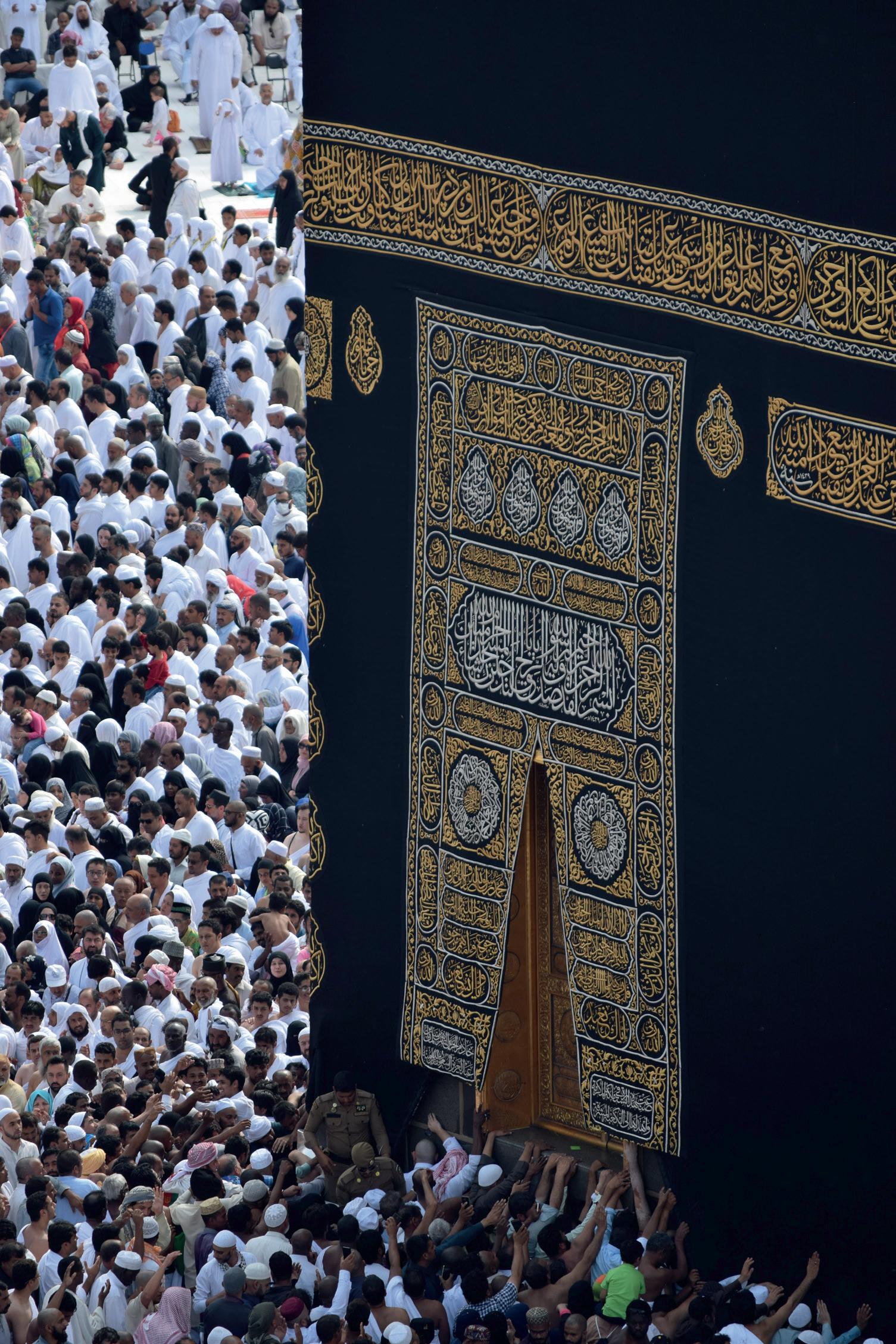
(Translated by Aqeel Ahmad Kang, London)
100 Years Ago... Tabligh is incumbent upon every Ahmadi Muslim
Hazrat Maulana Abdur Rahim Dardra (1894-1955) Nazir Talif-o-Ishaat, Qadian (1921)
O Ahmadi people! You are God’s chosen Jamaat. God has raised you to grab hold of falling people. Rise and perform your paramount responsibility more diligently than before.
Move forward and raise the banner of the true Islam in the world. Advance and march like the spring breeze. Spread like pleasant aroma in every corner. Emit fragrance and fill up every source of fragrance by exuding scent. Shine like the sun and illuminate every dark particle with your light.
God’s words from the Scriptures have been fulfilled. Prophet Muhammad’ssa prophecy came true. The most awaited Imam, the Promised Messiahas, appeared and O Ahmadi nation, he revived you. Thus go ahead and convey the good news to every human being on earth and breathe a new spirit into the body of this world. Tabligh is your duty as per God’s directions. The Holy Prophetsa laid emphasis on it. Prophet Ahmadas repeatedly instructed about it: اد� دشو تقو �بد تا ںنااجو ےا د�بکو اد� دشو ملت ٔضہور رندا نقور و ربہا [O youth! Make every effort to strengthen the religion and to bring blossom and prosperity in the garden of the nation of Islam.]
Moreover, O Ahmadi people, your caravan leader, Imam and chief, Hazrat Fazl-e-Umar, the resolute Khalifatul Masih II[ra], always instructs you that every one of you should become a missionary. He has said many times over that believing in the truth is not your only responsibility, but it is also your duty to persuade others.
Thus, O friends, rid yourselves from the sluggishness of the past. Get up and be active and leap forward into the field of tabligh. Yes, never be negligent and do not let sloth come near you: رود ہے دمقصو لمنز بہت ہے مشکل مکا ہو نہ مگا کبھی سست فاو ہلا ےمِر ےا [The task is difficult and the destination is far; O my loyal ones! never slacken your pace.]
In the last Jalsa Salana, Hazrat Khalifatul Masih[ra] drew the attention of friends to the duty of tabligh in very strong words and said that tabligh in the new year should be done with such enthusiasm and excellence that the loss of the previous year should also be evened up.
Thus, O friends, all of you should fully engage in tabligh. On the one hand, you should increase in righteousness, purity and improving yourselves, so much so that you become the beloveds of God and like stars for the earth.
On the other hand, call on those who are far from the spiritual fountain of the Messiahas of Muhammadsa and draw all the souls yearning for the truth towards you. Satisfy those who are hungry and thirsty for the truth. Conquer every pure heart with the power of your humble prayers. This is your compulsory and mandatory responsibility.
All friends should engage in tabligh in their respective areas from today. In fact, [start tabligh] from this very moment and never hold back from putting in your best effort when the opportunity presents itself. Those friends who want to carry out tabligh to prominent people by holding jalsas etc. or through missionaries, should inform the department of Talif-o-Ishaat by 1 April [1921] so that proper arrangements can be made for all. All the secretaries and in fact, every member of the Ahmadiyya Jamaat is the direct addressee of these words of mine. Every person who reads or listens to this article should consider it their duty to act on it. May Allah be with you. Amin! ... … When a person enters the Ahmadiyya Jamaat, it is because he recognises that truth, which has been manifested upon the world by God Almighty through the Promised Messiahas .
Owing to this truth, the shackles of rites and rituals are broken down. A kind of death befalls the previous lowly life. A person feels that a new life has been breathed into him and realises that he is no longer what he used to be. Hence, he becomes happy that he has been granted a matchless precious ruby.
The world laughs at his decision and humiliates him in various ways, but looking at the helplessness and negligence of the world, he wonders why it does not try to take the light that has appeared in this world today. Thus, he strives for every person to become the possessor of that light.
This is what is called tabligh. Hence, tabligh is a work without which a momin [true believer] cannot spend a single moment owing to his passion and sincerity of faith.
However, our pace of tabligh has been very slow in the recent past. It is for this reason that in the last Friday Sermon and on the occasion of Jalsa Salana, Hazrat Khalifatul Masih[ra] said that this year, work should be done with so much enthusiasm that [Ahmadiyyat] becomes the talk of the town in India and Ahmad’sas name reaches the corners of India.
Our missionaries should reach every single town. Every person, whether he belongs to a low caste or a high caste, should be acquainted with this light that has manifested in our time.
Thus, all friends should hold jalsas and carry out tabligh at their own places. They should gather their friends and other people in their cities, villages and surrounding areas and conduct lectures and sermons for tabligh.
In order to put this proposal into practice, it is the responsibility of the secretaries of various jamaats to inform the department of Talif-o-Ishaat by 1 April 1921. They should let us know as to when they can arrange for a jalsa at their place. We will make a programme and send our missionaries to different places after we receive all information.
In this way, we will be able to fulfill, to some extent, the duty that is our responsibility. Hence, the jamaats in general and the secretaries and presidents in particular should immediately pay special attention towards it and inform the said department soon after deciding the dates.
I cannot help but say that friends should not be content with mere jalsas; every Ahmadi should be fully determined in their heart that the truth they have acquired must be passed on to others. The nation’s young and old should all be aware that this is no time for negligence.
Convey to others what you have been entrusted with and before the day comes when you depart from here, straighten up your affairs with God so that you can say before Him, “We have fulfilled our duty and we not only accepted that truth which You gave us but also passed it on to others.”
May Allah the Almighty be with you and help you to fulfill your responsibility.
Wassalam
Humbly yours,
Rahim Bakhsh [also known as Maulana Abdur Rahim Dardra], Nazir Talif-o-Ishaat, Qadian
Al Fazl, 3 & 7 February 1921
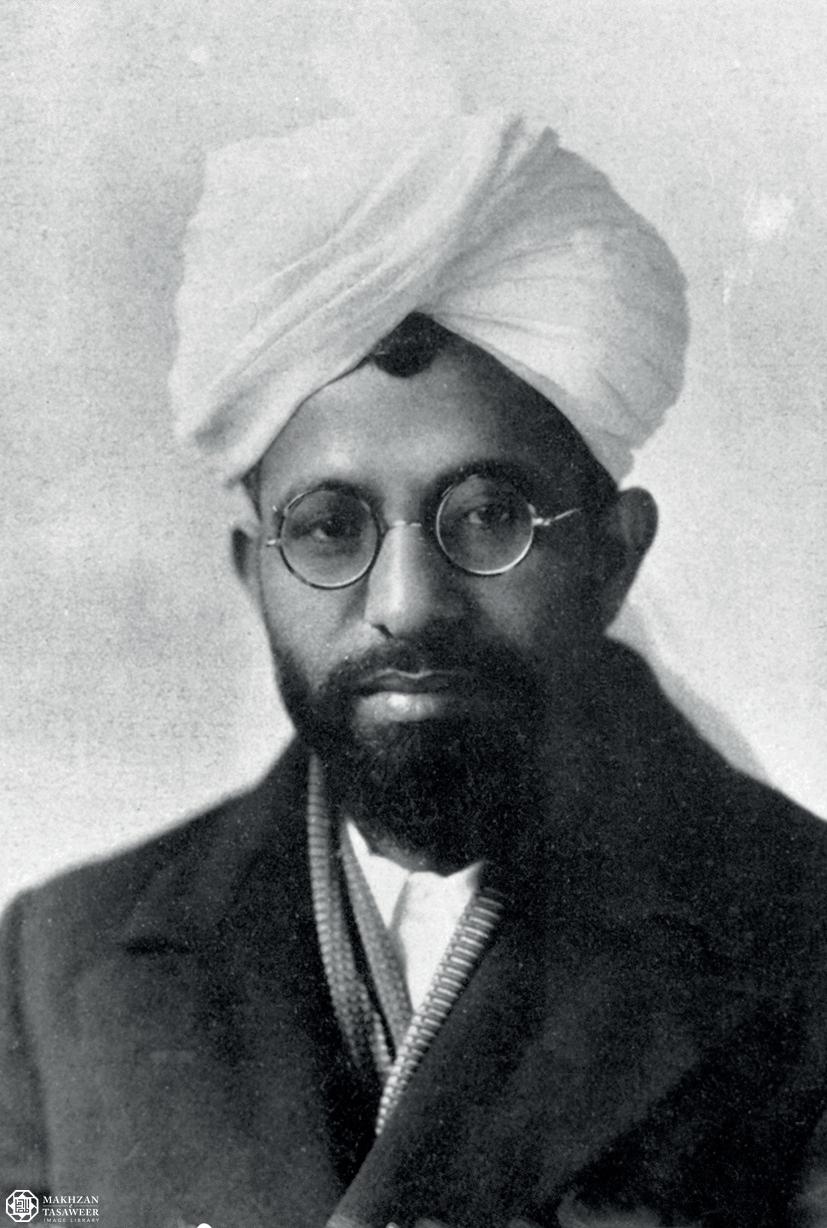
Hazrat Maulana Abdur Rahim Dardra
(Translated by Al Hakam from the original Urdu in the 3 & 7 February 1921 issue of Al Fazl)
Kenya Ansarullah hold national tilawat competition
Tahir Ahmad Machengo Kenya Correspondent
On 20 December 2020, Majlis Ansarullah Kenya held their first virtual tilawat competition.
After the first round of the competition, 10 Ansar from various regions of the country made it for the finals. In this competition, the last seven verses of Surah al-Hashr (Ch.59: V.19-25) were recited.
The competition was hosted by Abdul Aziz Gakuria Sahib, Naib Sadr Saff-eDaum, Majlis Ansarullah Kenya.
The panel of judges included three missionaries, Afzal Zafar Sahib, Faheem Ahmad Lakhan Sahib and Malik Basharat Sahib.
Finalists were asked to recite selected verses from the Holy Quran and thereafter, one of the judges would express his thoughts and corrections too where necessary.
At the end of the competition, each judge was given five minutes to talk about the importance of the rules and regulations of and blessings of reciting the Holy Quran. They further expressed their thoughts and suggestions about the competition.
Sameer Ahmad Sheikh Sahib, Sadr Majlis Ansarullah Kenya, then expressed his gratitude to all the participants, judges, organisers and listeners who took part in this blessed event.
He announced the winners and informed that all the participants would also receive a copy of the Holy Quran as a gift and urged them to recite it on a daily basis.
At the end, Tariq Mahmood Zafar Sahib, Amir and Missionary-in-Charge Jamaat Kenya, delivered his concluding speech on the importance of the study of the Holy Quran and its benefits.
Impressions of Bangladesh waqifeene-nau following virtual mulaqat
Abdul Munim Khan Chowdhury Bangladesh Correspondent
Waqifeen-e-nau of Bangladesh had the most blessed opportunity to have a virtual class with Hazrat Amirul Momineenaa on 30 January 2021. This class was a truly rejuvenating one for the waqifeen.
This historic mulaqat originated from requests from waqifeen-e-nau from different areas of Bangladesh to have a class with Huzooraa .
Amidst the pandemic, regular online classes were held for waqifeen-e-nau in Bangladesh and some of them expressed their deepest desire to have Huzooraa preside over one such online class.
Upon this, Secretary Waqf-e-Nau, Hasib Hasan Sahib wrote a letter to Huzooraa seeking his gracious presence in one such class. Beloved Huzooraa graciously approved 30 January 2021 for a class with waqifeene-nau and another on 31 January with waqifaat-e-nau of Bangladesh.
The class with waqifeen-e-nau lasted for over an hour, where 136 waqifeen-enau, along with the national amir, secretary Waqf-e-Nau and zonal secretaries of Waqf-e- Nau were in attendance.
After the class, the participants gave their impressions of this meeting.
Qasem Amin Sahib said:
“This was the best day in my life. A million thanks to Allah for letting me have the opportunity to meet Huzooraa virtually.”
Dr Ijazur Rahman Sahib, Zonal Secretary Waqf-e-Nau Chattagram, said:
“I could not move my eyes from Huzooraa; such was the awe I was in.”
Muhammad Arif Sahib said:
“If not for this pandemic, I might never have had the chance to meet with Huzooraa like this. May Allah enable me to meet with Huzooraa once again. Amin.”
Mahmud Ahmad Rudro Sahib said:
“This was an occasion of absolute joy and ecstasy for me. Before this, I only got to see Huzooraa on different media platforms, but today, I got to meet him virtually.”
Naser Ahmad Sahib said:
“I was excited as well as scared before meeting Huzooraa. But after the meeting, I felt nothing but joy and elation. May Allah enable me to meet Huzooraa over and over again. Amin.”
Shahriar Kabir Bishal Sahib said:
“I feel really blessed and fortunate to have attended this virtual class with Huzooraa. I will try my level best to abide by the valuable guidelines given by Huzooraa.”
Masroor Ahmad Sahib said:
“Today, I feel really proud to be a waqife-nau because I had the opportunity to meet with the Imam of the time. I thank Allah and Huzooraa for this blessed opportunity.”
Ausaaf Ahmed Sahib said:
“Alhamdulillah and thanks to Huzooraa for letting me have this blessed opportunity to meet with you. I am lost for words.”
SM Saihan Ferdous Sahib said:
“This is a historic day in the history of Waqf-e-Nau Bangladesh. I feel honoured and proud as a Bangladeshi waqif-e-nau to have had this chance to meet with Huzooraa virtually.”
Hares Ahmad Sahib said:
“I feel at peace and blessed after meeting with Huzooraa. In the 16 years of my life, I have never felt such happiness. Being addressed by Huzooraa directly is a great blessing indeed.”
May Allah make this historic meeting with Huzooraa the beginning of a new and glorious chapter for Waqfe-e-Nau Bangladesh. May Allah accept all our lifededications and enable us to serve His Jamaat. Amin.
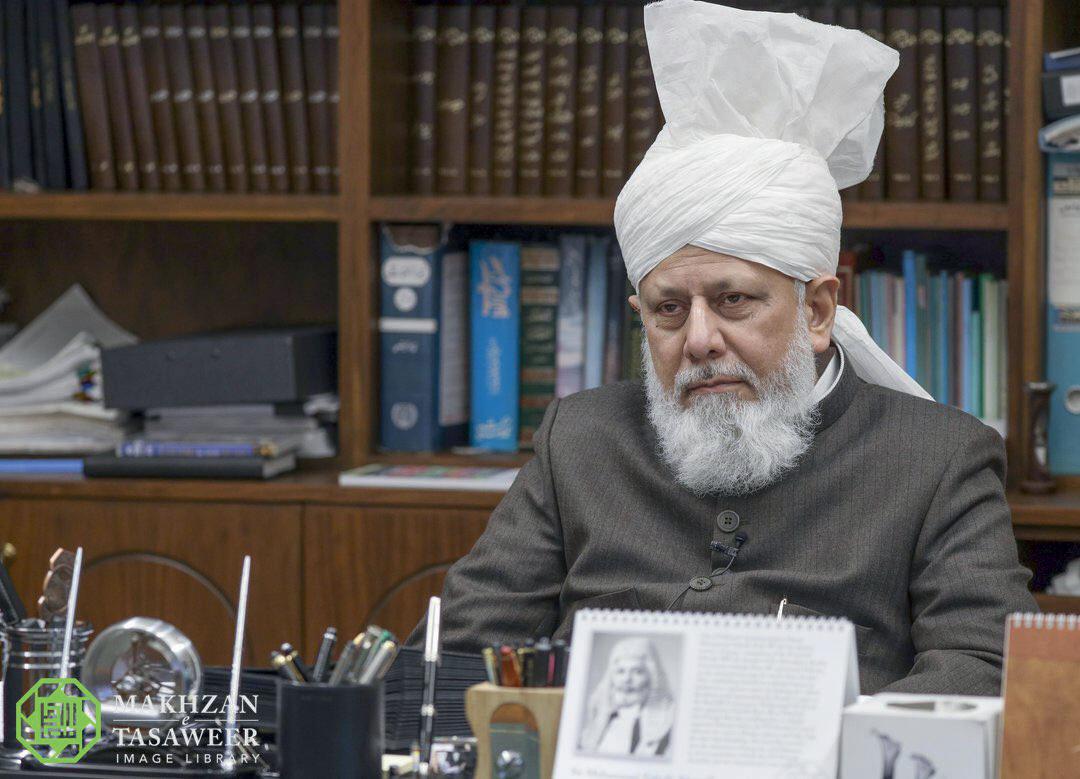
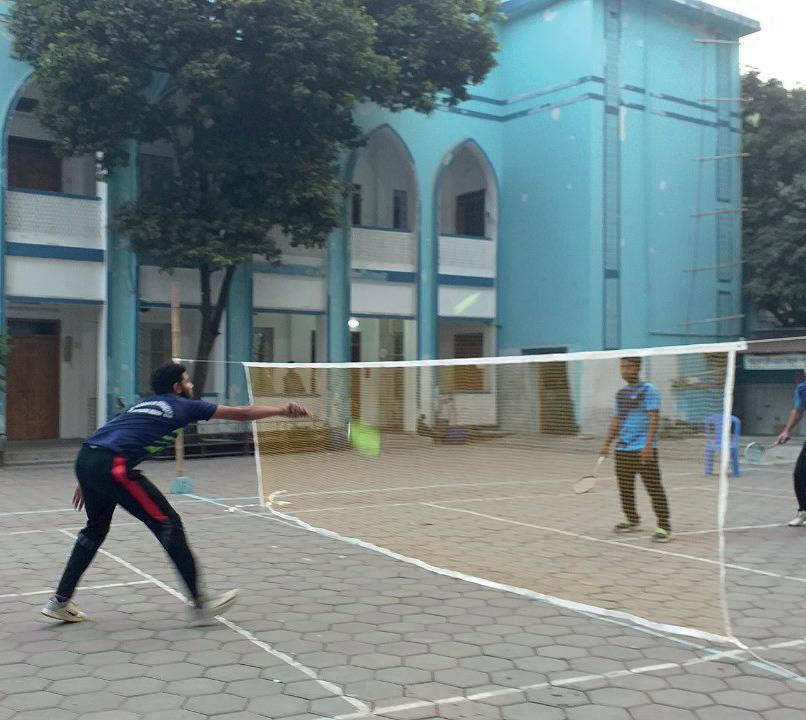
Muhammad Golam Rabbi MKA Bangladesh
Majlis Khuddam-ul-Ahmadiyya Bangladesh organised its first ever Masroor Badminton Tournament. 70 local majalis participated from across the country.
Initial selections of players were done in three phases: local phase, district phase and the regional phase.
On 31 December 2020 at Dhaka Darut Tabligh mosque complex, the final phase of the tournament was inaugurated by Sadr Sahib MKA Bangladesh, Mohammad Zahed Ali Sahib.
In the final phase – from five regions of the country (Dhaka, Chattogram, Mymensing, Khulna and Rangpur) – the 12 best players participated. Some of the matches including the final were streamed live on Facebook and YouTube.
On 2 January 2021, the final match and prize distribution ceremony started.
The doubles title was won by Dhaka region’s GM Abujar Rahman Sahib and Tazveer Sardar Sahib.
The singles title was won by Mabroor Ahmed Chowdhury Sahib of Chattogram region.
The chief guest of the prize distribution ceremony was Abdul Awwal Khan Chowdhury Sahib, Amir Jamaat-eAhmadiyya Bangladesh.
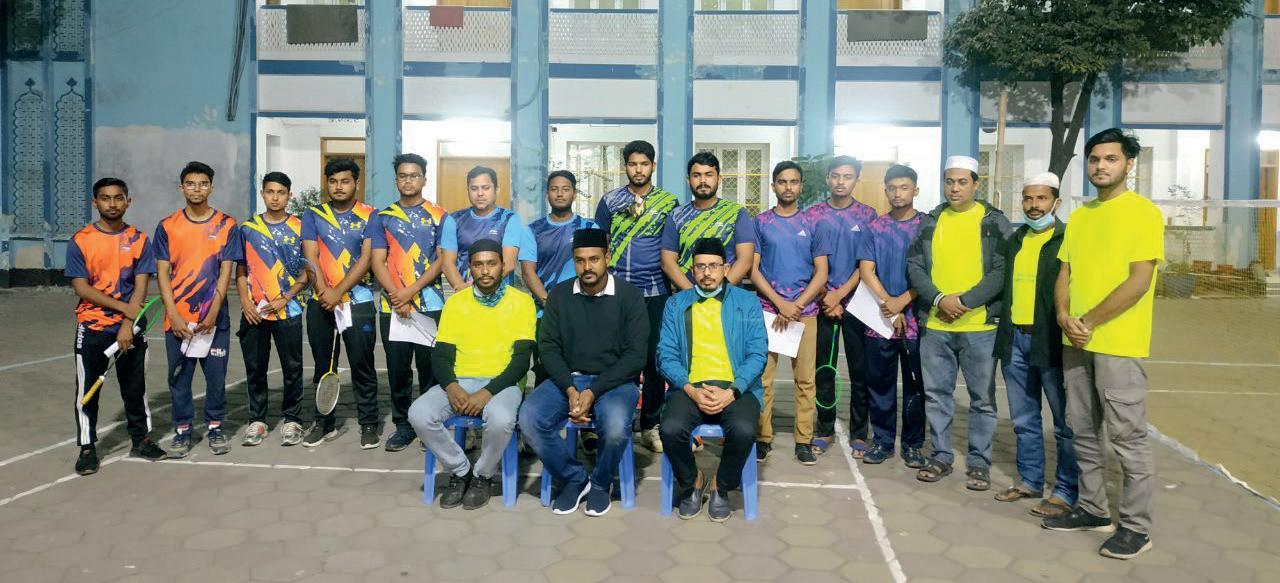
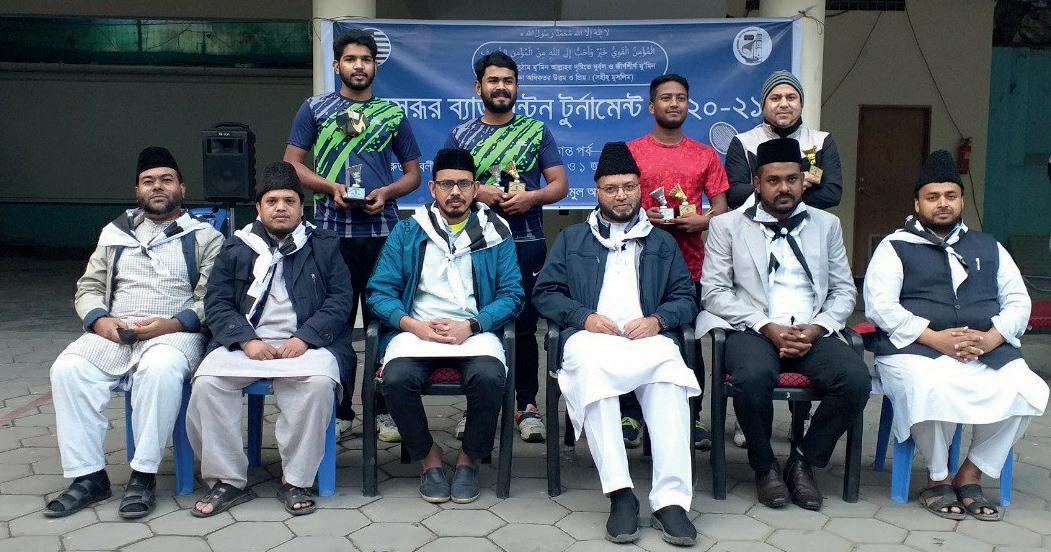
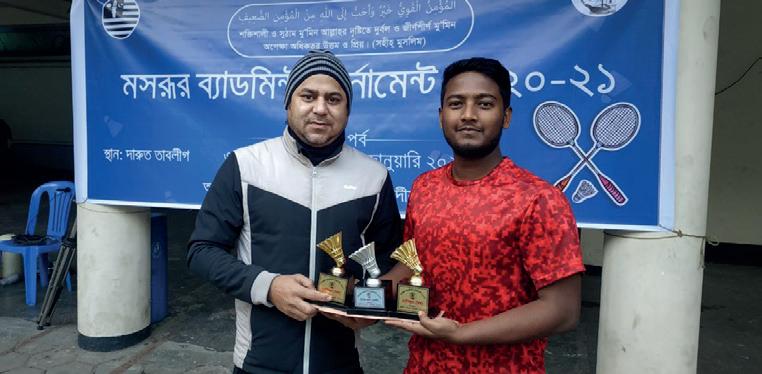
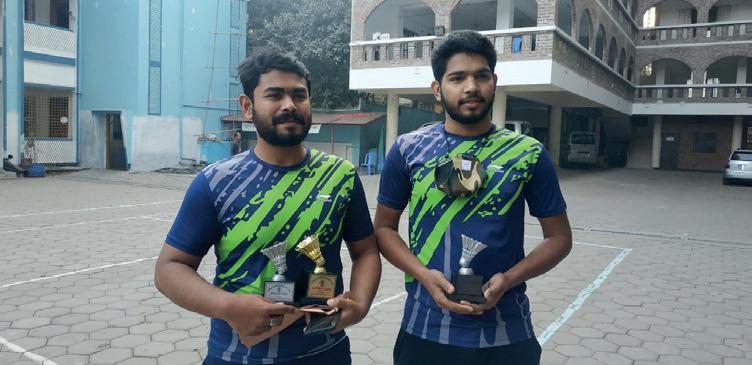
Responding to Allegations The need and time of the Promised Messiah’s appearance

M Adam Ahmad Al Hakam
Opponents of the Promised Messiah and Mahdi, Hazrat Mirza Ghulam Ahmadas , suggest that the time of the appearance of the Latter-Day Messiah has not yet come and in their view, the founder of the Ahmadiyya Jamaat presented his claim when there was no need for the Messiah.
Th e time when the Promised Messiahas appeared was not an ordinary age. Almost every religion was waiting for a chosen one of God, who would come and save the sinking ship of mankind. It was a time when moral and spiritual corruption was at its peak and darkness prevailed the earth. Th e signs mentioned in the Holy Quran and the prophecies of the Holy Prophetsa related to the most awaited Messiah were becoming manifest. Th e scholars and saints in the time of the Promised Messiahas also expressed that it was indeed the age of the appearance of the Messiah.
Th e Promised Messiahas hassaid:
“In this age, the world is brimming with disagreements. Th e Jews say one thing, whereas the Christians profess another and aside from this, the ummah of Muhammad is mired in internal confl icts. Meanwhile, the idolaters present their opinions against all of the others. So many new religions and beliefs have arisen that everyone seems to be practicing their own unique brand of religion. Th erefore, in conformity with the established practice of Allah, it was essential that a hakam [arbiter] should have come to settle all of these disputes. Hence, that very hakam was bestowed the titles ‘the Promised Messiah’ and ‘the Blessed Mahdi’, meaning that, he was deemed to be the Messiah on account of resolving external disputes and he was proclaimed the destined Mahdi on account of settling the internal confl icts.” (Th e Philosophy of Divine Revelation [English translation of Haqiqatul Wahi], p. 57)
Th e writings and sayings of the Promised Messiahas comprehensively shed light on the conditions and circumstances of his time. Moreover, he frequently drew attention of the people of his age that he was sent as the Messiah by God Almighty because the need of the time demanded his appearance.
In his book, Kitab-ul-Bariyya, the Promised Messiahas states:
“All the indications mentioned in the Holy Quran and the ahadith with regard to the Promised Messiah have been combined in me and in my age and in my country; as, for instance, the age and the country and the town in which the Promised Messiah was to appear, and the circumstances which called specially for his advent, and the earthly and heavenly occurrences which had been specifi ed as indications of his advent, and the knowledge and learning that were to be his characteristic, have all been combined in me. In addition to these, and to provide further satisfaction, I have been strengthened by Heavenly support. ندا ہداد ���سم مقو � زا � ا� ں� ندا ہد� � منا �� �ا ار � مز د�� � قت�ا ن� در� ں�آ ندا ہد�ا � �� � زا �� ود �ا [As I was invested with authority for the Christians, I was, therefore, named the Son of Mary. Heaven is showing signs and the earth proclaims that this is the time. Th ese two witnesses stand fi rm in my support.]
“Th e detail of the above is that the indication given in the text of the Holy Quran proves that the Holy Prophetsa appeared in the likeness of Mosesas, and that the chain of Khilafat aft er the Holy Prophetsa would be very similar to the chain of Khilafat established aft er Mosesas. Just as Prophet Mosesas was promised that in the Latter Days – i.e. when the prophethood of Bani Israel would reach its limit and Bani Israel would be divided into many sects, each contradicting the other, so much so that some would declare others to be infi dels – God Almighty would raise a successor, i.e. Prophet Jesusas, to support the faith of Mosesas; he would gather the scattered sheep of Israel, and bring sheep and wolves together at one place, and he would be an Arbiter for all the sects of Bani Israel, and he would iron out their diff erences and remove all rancour and illwill; likewise, a similar promise was made by the Holy Quran in the verse: مہب اوقحلی امل مہنم نیر�ا و
“[Others from among them who have not yet joined them. (Surah al-Jumuah, Ch.62: V.4)] Many details of this are set out in the ahadith. For instance, it is mentioned that Muslims would become divided into as many sects as the Jews; they would contradict each other and brand each other as infi dels; and would increase in hatred and enmity towards each other, till the time when the Promised Messiah would appear as an Arbiter. He would remove all rancour and hostility. During his time, the wolf and the sheep would be brought together.
“All historians are aware that, at the time of the advent of Jesusas, the Israelite sects were ridden with dissension and labelled each other as heretics and infi dels. I have also appeared at a time when inner dissension has multiplied and each sect has started calling others kafi r [disbeliever]. At such a time of dissension, the Muslims were in need of an arbiter. God has, therefore, sent me as one.” (Essence of Islam, Vol. 4, pp. 63-65, [Kitab-ul-Bariyya, Ruhani Khazain, Vol. 13, pp. 254-257])
Explaining the time when the LatterDay Messiah was to appear – according to the prophecies of the old scriptures, the Holy Quran, ahadith and saints – the Promised Messiahas said:
“Th e Jewish and the Christian prophecy that is inferred from the Bible affi rms it; namely, that the Promised Messiah will be born at the end of the sixth millennium from the birth of Adam. According to the lunar calendar, which is the original calendar of the People of the Book, my
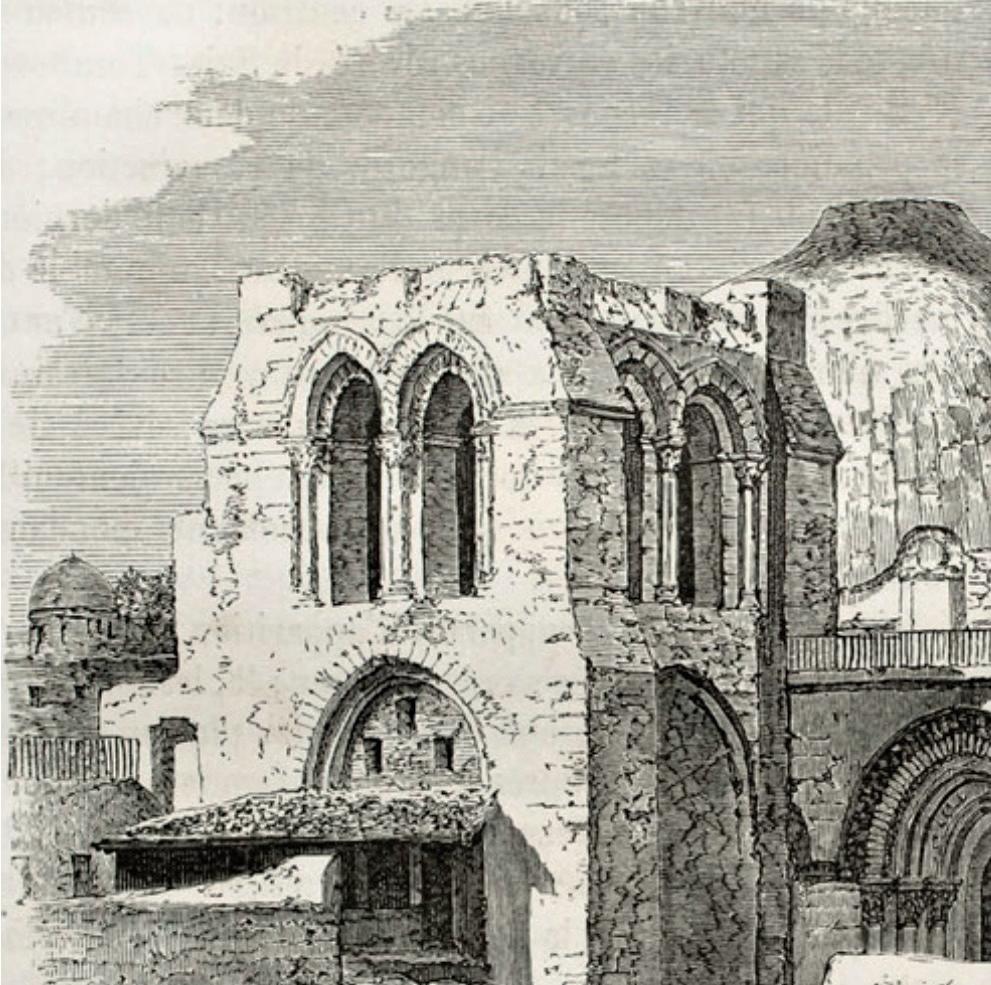
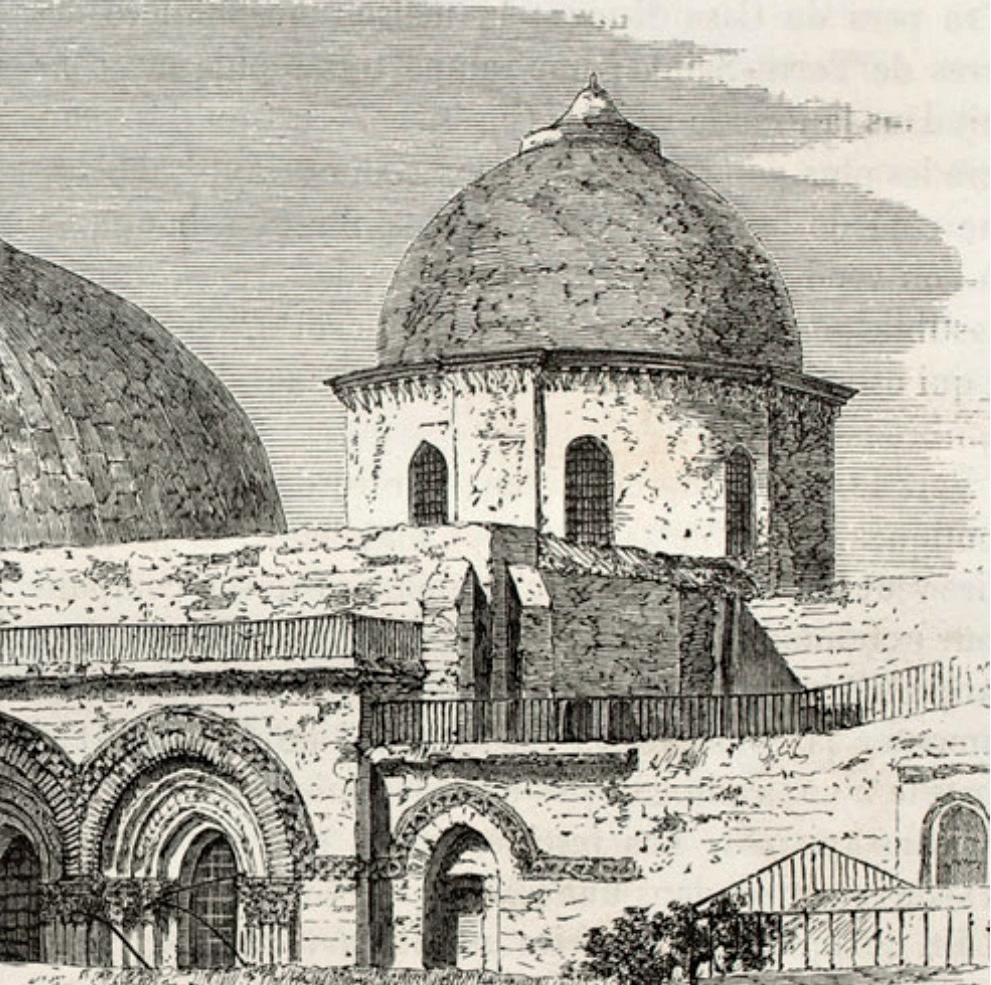

birth took place at the end of the sixth millennium – and the birth of the Promised Messiah had, since the beginning of time, been preordained by God to take place at the end of the sixth millennium because the Promised Messiah is Khatamul-Khulafa [the seal of the Khulafa] and the last ought to have similarity with the first.
“Since Hazrat Adamas was born in the last part of the sixth day, it was necessary with respect to the parallelism that the last vicegerent – who is the last Adam – should also be born at the end of the sixth millennium. This is because each day of the seven days of God equals 1,000 years, as Allah Himself says: نودعت امم ۃنس فلاک کبر دنع اموی نا و
“[And verily, a day with your Lord is as a thousand years of your reckoning’. (Surah al-Hajj, Ch.22: V.48)] Authentic ahadith also bear out that the Promised Messiah would be born in the sixth millennium. (God Almighty has disclosed to me that, according to the Jumal [Abjad] system of numbers, the numerical value of the letters constituting Surah al-Asr indicates the number of years that have passed since the beginning of Adam up to the Holy Prophet, may peace and blessings of Allah be upon him. In accordance with this blessed surah, when calculated up to this age, the seventh millennium has now started. And according to this calculation, my birth has taken place in the sixth millennium.) This is why all those blessed with [spiritual] visions have not gone beyond the sixth millennium in fixing the time for the Promised Messiah and the outermost limit of the time of his advent is stated as the 14th century Hijrah. (See Hijajul-Kiramah, compiled by Nawab Siddiq Hasan Khan of Bhopal)
“Muslims who were gifted with spiritual visions have foretold that the Promised Messiah – who is the last Khalifa and Khatamul-Khulafa – is like Adam in that he would be born at the end of sixth Millennium, just as Adam was born at the end of the sixth day.” (The Philosophy of Divine Revelation [English translation of Haqiqatul Wahi], pp. 252-253)
On another occasion, the Promised Messiahas said:
“The Holy Quran clearly and markedly draws a parallel between the successorship of both the Israelite and Ishmaelite dispensations. This is apparent from the following verse: مہنفلختسیل تحلصلا اولمع و مکنم اونما نیذلا ہللا دعو مہلبق نم نیذلا فلختسا امک ضرالا یف
“[Allah has promised to those among you who believe and do good works that He will surely make them Successors in the earth, as He made Successors from among those who were before them’. (Surah alNur, Ch.24: V.56)] The last successor of the Israelite dispensation who appeared in the fourteenth century after Mosesas, was the Messiahas of Nazareth. In parallel to this, it was necessary for the Messiah of this Ummah to also appear at the head of the 14th century. Additionally, those blessed with visions have declared this century to be the one in which the Messiah would appear.
“Hazrat Shah Waliullah Sahibrh and others from among the Ahl-e-Hadith all agree that all the alamaat-e-sughra [minor signs] and to some extent the alamaat-ekubra [major signs] have been fulfilled. However, they have erred somewhat in this respect. All of the signs have been fulfilled.
“The major sign or hallmark of the one who is to appear can be found in [Sahih] Bukhari as follows:
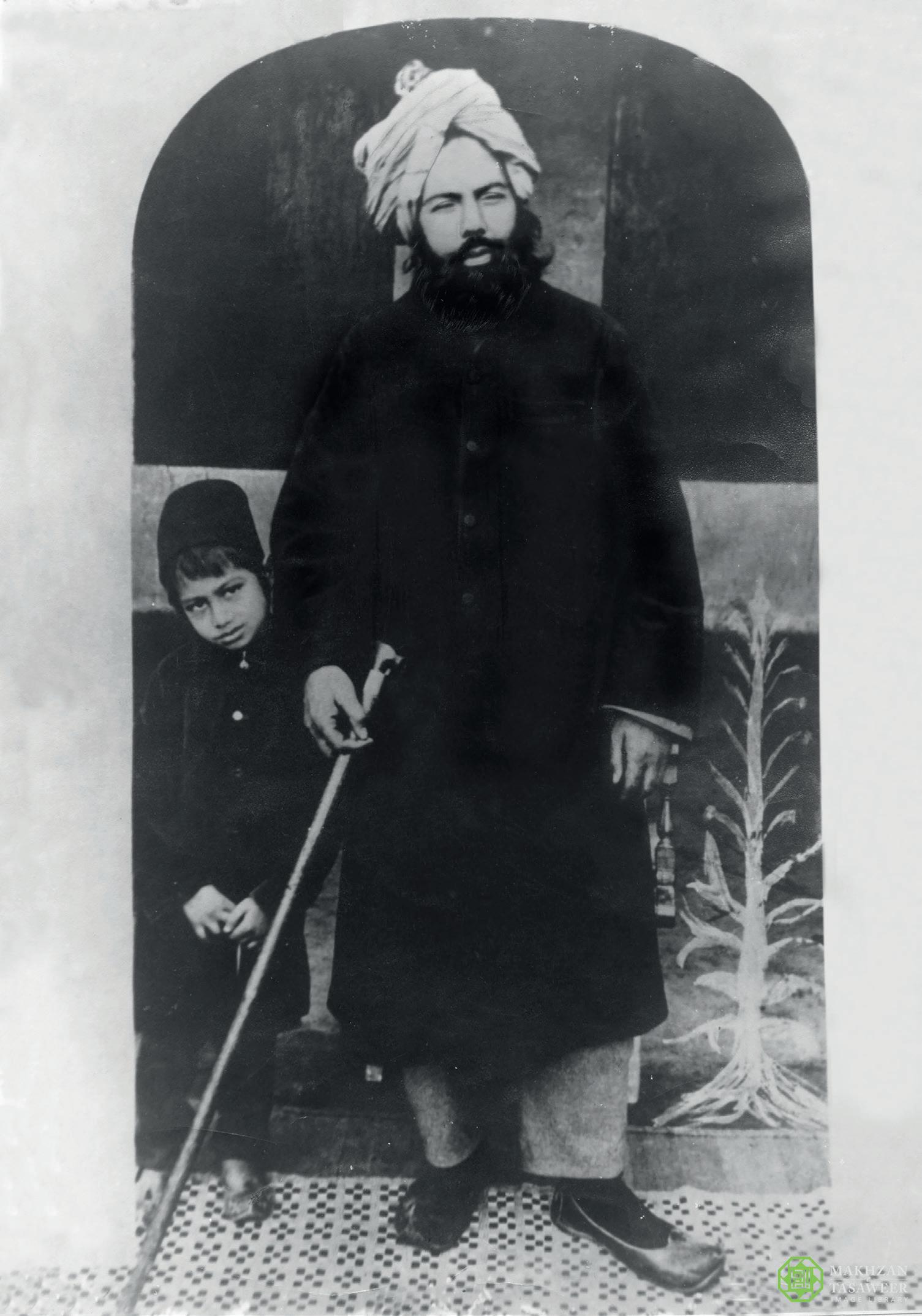
Hazrat Mirza Ghulam Ahmadas, the Promised Messiah and Imam Mahdi with his son Hazrat Sahibzada Mirza Sharif Ahmadra
ریزنخلا لتقیو بيلصلا رسكی
“In other words, ‘The era in which the Messiah shall descend is marked by the dominance of Christianity and prevalent worship of the cross.’
“Is this not such a time? Has there been such a time from the era of Adamas until now when such harm was ever inflicted upon Islam by the Christian priests? Division has plagued every country. There is no Muslim family who has not lost a member or so to their hands. Hence, the era of he who was to come is one in which worship of the cross would be dominant. What could be more dominating than what we see now? Vicious attacks like those of ravenous beasts have been made against Islam.
“Is there a single group that has not made the most savage of remarks against the Noble Messenger, peace and blessings of Allah be upon him, and hurled abuse at him? If now is not the time for the advent of the awaited one, the earliest that he can appear now is after a hundred years, for a divinely appointed mujaddid [reformer] must always appear at the head of the century.
“Now, does Islam possess enough strength to combat the ever-increasing dominance of the Christian priests for another century? This ascendancy has reached its pinnacle and the one who was to appear has come. Now, he shall destroy the Anti-Christ with clinching argumentation, for it is recorded in the hadith that nations would be overturned, not people themselves or the individuals that comprise these nations. And so has it occurred.” (Malfuzat, Vol. 1, pp. 47-48)
In one of his couplets, the Promised Messiahas says: قتو کا روا کسی نہ ا�ح�سم ِقتو تھا قتو تاہو ا�آ ہی روا ئیکو تو تاآ نہ م
“This was indeed the appointed time for none other than the Messiah; Had I not been appointed, someone else would surely have appeared!” (Durr-e-Sameen, p. 196)
God Almighty gave countless signs to the Promised Messiahas to support his claim and to indicate the time of his arrival. The opponents say that he made up all those signs by himself to attract the attention of the common people. However, the signs which were granted to the Promised Messiahas are so manifest and powerful that rational minds could not possibly argue that there was any other hand behind those signs except that of God Almighty.
For example, the sign of the solar and lunar eclipse. In this regard, the Promised Messiahas says:
“Another sign in support of the awaited one is that in his era, during the month of Ramadan, the solar and lunar eclipses would occur. Those who ridicule divine signs in fact mock God Himself. For the solar and lunar eclipse to take place after the claim of the awaited one is something that no one could possibly forge or fabricate.
“Before this, no such solar or lunar eclipse had taken place. This was a sign by which Allah the Exalted was to proclaim the arrival of the awaited one throughout the entire world. And so, upon witnessing this sign, the Arabs have also proclaimed its truth, as is their nature. Wherever our announcements could not reach to serve as public pronouncements, this solar and lunar eclipse announced the coming of the era of the awaited one.
“This was a sign of God completely free from human machination. No matter how strictly philosophical a person may be, they ought to reflect and contemplate that when the appointed sign has been fulfilled, it necessarily follows that the one in whose favour the sign was manifested, must also be present. This was not a matter that could have been predetermined because it was stated that the sign would be manifested after a person who claimed to be the Mahdi had appeared. The Noble Messenger, peace and blessings of Allah be upon him, also said that no such incident would have occurred from the time of Adamas to this Mahdi. If anyone can historically show otherwise, I shall accept.” (Malfuzat, Vol. 1, pp. 48-49)
Alluding to the need and time of his arrival, the Promised Messiahas said:
“In every respect, the perfection of guidance took place during the first advent of the Holy Prophetsa and the perfection of the propagation of faith (i.e. the spread of this message) was to take place through the second advent of the Holy Prophetsa . This is because the verse in Surah alJumuah that reads, ‘And there are others from among them’ demands that another group of people should also be prepared through his grace and guidance. From this, it becomes clear that there is another advent of the Holy Prophet Muhammadsa and this advent, in the form of a buruzi manifestation [spiritual reflection of the Holy Prophetsa], is taking place in this era.
“Hence, this age is one in which there was to be a complete spread of this faith. This is also why all means of communication and conveyance are also reaching their pinnacle. There is a multitude of publishing houses, countless printing presses and with each day, there are further improvements and developments in publishing and printing. There is also the use of courier and mail services and the emergence of post offices, wired mail, the railroad, aeroplanes and the publication of newspapers – all of these things have combined to transform the world into a global village.
“In actual fact, these advancements are in service to the Holy Prophetsa because through them, the perfect renaissance of Islam, i.e. the complete spread and delivery of his message, is taking place.” (Malfuzat, Vol. 4, p. 10)
Thus, it was high time for the advent of the Promised Messiahas and mankind was desperate for a saviour and a reformer. The ummah of the Holy Prophetsa was especially
in dire need of an imam.
Referring to this point, the Promised Messiahas states:
“O people! Allah’s argument has been clinched against you; so, whereto do you flee? And certainly His Signs have appeared from all sides.
“Islam has descended into the cave of banishment and its commandments are not being practised. Every calamity has descended upon it, every affliction has exposed its canine teeth for it and every misfortune has opened its door to it. The sixth millennium, during which the Messiah was promised to appear, has already passed. So what do you think? Did Allah go against His promise or did He fulfil it?
“Do you not see how all nations have united against this religion? They have attacked it together like a pack of wild beasts that emerges suddenly from behind a single cluster of trees. Islam has become like a lonely outcast and the target of every transgressor. It is Eid for the opponents, but ours is the moon of Dhul-Qa‘dah [one of the four Islamic months in which fighting is forbidden by God Almighty]. We sit in utmost fear and terror, as if vanquished by the disbelievers. They malign our religion and their taunts are worse than the attacks of spears.
“In the face of all that, my Lord appointed me at the turn of the century. Do you think that He sent me without necessity? By Allah, I see that the need [for my advent] is greater than in previous times. Good fortune has disappeared like a slave who has fled.
“Islam was like a man with a wonderful physique and handsome face, but now you will see the ugliness of religious innovations and the wounds of fabricated rituals on its face. And its robustness has turned into frailty, the clear water of its spring into murky water, its light into darkness and its mansions into wastelands.
“It has become like a home with no inhabitants or like a honeycomb with nothing left in it except the bees. How can you imagine that God did not send a mujaddid [reformer] in this age when this was the precise time for bringing down the heavenly food – not for folding up the dining table? How can you imagine that the Benevolent God did not want to reform mankind in the face of this profusion of innovations and flood of evils.” (The Philosophy of Divine Revelation, pp. 814815 [English Translation of Al-Istifta in Haqiqatul Wahi])
Hence, it is unwise to deny the Messiahas of Muhammadsa in the presence of countless conclusive arguments in his favour. The pitiable condition of the world was crying for a reformer, so Allah the Almighty sent the Imam Mahdias to fulfil his promise and cater its needs.
Thus, the most suitable age of the Promised Messiah’sas arrival was when Hazrat Mirza Ghulam Ahmadas was appointed by God Almighty as the Messiah and Mahdi of this age.
(Research support by Awwab Saad Hayat, Al Hakam)

The exemplary young Companions: Generosity and selflessness
Rahmatullah Khan Shakir (1901-2000) Former Assistant Editor and Manager of Al Fazl
Slaughtering camels for the needy
Hazrat Ubaidullahra bin Abbas was very young during the time of the Holy Prophet, peace and blessings of Allah be upon him. Generosity became his hallmark when he grew to adulthood. Every day, he would slaughter a camel to host the needy. His brother termed it extravagance and disapproved of it. Instead of giving up this good habit, Ubaidullahra started slaughtering two camels daily. (UsdulGhabah, Vol. 3, p. 421)
Invitation to access personal belongings
Hazrat Abu Shuraihra accepted Islam before the fall of Mecca and was very generous by nature. He had announced it publicly that whoever could get access to the milk [of his animals], ghee [butter] or lamb was freely allowed to use them. Everyone was allowed to use his belongings unhesitatingly. (Al-Isti‘ab, Vol. 4, p. 1689) before the Hijra of the Holy Prophetsa . Hence, he was quite young when he embraced Islam.
Once, he was sitting in the company of the Holy Prophetsa, when the dead body of an Ansari was brought for funeral prayer. The Holy Prophetsa enquired from people if he owed anybody anything. The people replied in the affirmative.
He then asked if he had left anything in his inheritance. The people replied that he had left nothing. At this, the Holy Prophetsa asked the people to offer his funeral prayer. Hazrat Abu Qatadahra asked, “O Prophetsa of Allah! Will you offer his funeral prayer if I pay off on his behalf?” He replied, “Yes.”
Hazrat Abu Qatadahra rose to his feet, brought money from his home and paid off all the debt of the deceased. (Musnad Ahmad bin Hanbal, Vol. 6, p. 403)
Distributing wealth among the needy
Hazrat Saeed bin Al-Aasra was a wealthy young man of the Banu Umayyah family, whose generosity and liberality was well reputed. It was his practice to invite his brothers, their sons and his dependents at lunch once a week. He would help the needy with cash and clothes as well.
Every Friday night, in the mosque of Kufa, he would distribute pouches full of dinars among the worshippers. He would never turn down any needy person who asked him for something. He was so cautious in this regard that when he would not have anything to give to somebody asking for money, he would give him a written note saying to come and collect the money later. (Al-Isti‘ab, Vol. 2, p. 621)
It is related about him that once, somebody followed him when he had returned from the mosque. Thus, Hazrat Saeedra asked him what he was up to. He replied that he had seen him returning alone and therefore he wished to escort him.
Hazrat Saeedra asked him to call his servant and also to fetch a pen. The latter complied. Hazrat Saeedra gave him a bill of exchange of 20,000 and said that although he did not have the money at that time, he should come and collect it later.
At his death, Hazrat Saeed bin Al-Aasra owed 10,000 gold coins. His son asked how he had to owe this amount. He was told that he supplied people’s needs and sometimes gave them before they had even asked. (Al-Isti‘ab, Vol. 2, p. 621)
Hazrat Muazra bin Jabal passed away at the young age of 36. He was so generous and sympathised with the destitute so much that by the time he died, his entire property had been sold. (Usdul-Ghabah, Vol. 1, p. 421)
Provisions for the elderly
An old lady came to Hazrat Saadra bin Ubadah and told him that there were no mice in her house, by which she meant that she had no grains and cereal etc. (Mice are found where there are grains etc.)
In reply, Hazrat Saadra commented, “What a nice way to ask. You may go and henceforward you will find mice all over your house.”
Thus, he filled her house to its capacity with grains, edible oil and other food items. (Darus-Sahabah fi-man Dakhala Misr min-as-Sahabah, p. 100 [under “Qais bin Ibadah”, No. 221])
Generosity of Hazrat Zubairra bin AlAwam
Hazrat Zubairra bin Al-Awam accepted Islam when he was only 16 years old, but he was fully imbued with the Islamic teachings. He owned about a thousand slaves, who would provide for him a reasonable amount everyday by working on daily wages. But instead of spending anything out of it on himself or on his family, he would give all of the money in charity, without keeping even an iota of it for himself. (Al-Isabah, Vol. 2, p. 460)
Hazrat Zubairra was so generous that despite being so rich, he fell into a debt of 2.2 million dirhams. (Sahih al-Bukhari, Kitab Farzul-Khumus, Bab Barkat-ulGhazi fi Malihi Hayyan wa Mayyitan)
The door of Hazrat Zubair’sra house was always open for the poor and destitute.
Qais bin Abi Azim says that he had not seen anybody who spent so graciously and selflessly as Zubairra. (Fath-ul-Bari, Vol. 7, p. 83)
Distributing wealth among one’s tribe
Hazrat Talhara sold a property of his for 700,000 dirhams and gave all of this money in the way of Allah. His wife, Saadira bint Auf, reports that once, she found her husband upset. She asked him the reason for his sadness and asked whether she had committed any mistake.
He replied in the negative and said, “You are such a good wife to me. The fact is that I have accumulated a large amount of money and I am thinking as to what to do with it.” She replied, “Have it distributed.”
Immediately, he called for a maid and distributed 400,000 dirhams among his tribesmen and women. (Tabqat Ibn Saad, Vol. 3, p. 165, Zikr Talha bin Ubaidullah)
Offering every last crumb for one’s friends
Hazrat Jafarra, the brother of Hazrat Alira , embraced Islam at a young age. Generosity and graciousness were his special traits. He would treat the poor and destitute with extreme compassion. He would take them to his home and host them.
Hazrat Abu Hurairahra reports that he found Jafarra to be the best towards the destitute. He would take the Ashab alSuffah [companions who remained in the close company of the Holy Prophetsa in Masjid al-Nabawi] to his home in order to host them with whatever was available, so much so that sometimes he would bring empty containers of honey and oil. Abu Hurairahra says they would tear it apart and lick it out. (Sahih al-Bukhari, Kitabul-Manaqib, Bab Manaqib Ibn Abi Jafar bin Abi Talib)
Eagerness to eat with the less privileged
It was common practice for Hazrat Abdullah bin Umarra to share his meal with a less privileged person.
Once, some people criticised his wife that she did not serve her husband well. In reply she said, “What shall I do? I cook meals for him, but he shares it with someone less privileged.” His wife sent a message for those underprivileged people not to sit along the path [he used] henceforward. But Abdullahra would call them from their houses.
His wife sent another message not to come even when he called them. Thus, the next time they did not answer and that night, Hazrat Abdullahra ate nothing from his meal. (Tabqat Ibn Saad, Vol. 4, p. 125, Zikr Abdullah bin Umar)
Hazrat Saadra bin Ubadah’s generosity was well reputed far and wide. As night fell, a servant of his would announce aloud, “Anybody who wishes to eat meat and fat should come here.”
At times, Hazrat Saadra hosted as many as 80 Ashab al-Suffah at a time. (Al-Isabah, Vol. 3, p. 56. Zikr Saad bin Ubadah)
Parents’ encouragement for their children’s generosity
Hazrat Qais bin Saadra was the standardbearer of the Ansar and was extremely generous. In one battle, food supplies were short and he hosted the whole army by taking a loan.
Hazrat Abu Bakrra and Hazrat Umarra , too, had joined in this battle. Both of them decided to stop him or else he would lose the property of his forefathers. But when Qais’ra father [Hazrat Saadra bin Ubadah] learnt that Hazrat Abu Bakrra and Hazrat Umarra wanted to stop his son, he complained to the Holy Prophetsa and said, “Who will protect me from these two, who wish to make my son niggardly?” (Usdul-Ghabah, Vol. 4, p. 125, Zikr Qais bin Saad bin Ubadah)
Feeding one’s brethren
Hazrat Qais bin Ubadahra was so generous that wherever he went, a servant always followed him with a bowl full of meat and soup and invited people to come and partake of it. (Usdul-Ghabah, Vol. 4, p. 125, Zikr Qais bin Saad bin Ubadah)
Assisting in the fulfilment of prayers
Once, Hazrat Imam Hasanra saw a man in the mosque supplicating to God to be granted 10,000 dirhams. Hazrat Imam Hasanra came home and sent him the amount he had supplicated for. (Tarikh Dimashq li-bni-Asakar, Vol. 13, p. 245)
Generosity towards an enemy
Once, an enemy of Hazrat Alira came to Medina but had no provisions and no mount with him for his journey. People directed him to Hazrat Imam Hasanra and said that he was most generous.
The man came to Hazrat Imam Hasanra, who provided him with both things. Somebody asked Imam Hasanra why he had been kind to such a person who was the enemy of him and his father. He replied, “Should I not safeguard my honour?” (Tarikh Dimashq li-bni-Asakar, Vol. 13, p. 247)
Selflessness of master and slave
Once, Hazrat Imam Hasanra passed through a date orchard and saw a black slave eating bread in such a way that he would put one morsel in his mouth and the other before a dog. In this way, he cast half the bread before the dog. Hazrat Imam Hasanra asked him, “Why don’t you drive away the dog?” He replied, “My sense of honour does not permit me to drive it away.”
Hazrat Imam Hasanra asked him the name of his master and told him to stay there until he returned. The slave continued with what he was doing in the orchard, while Hazrat Imam Hasanra went to his master and bought both the slave and the orchard from him. Once he returned, he told the slave that he had purchased both him and the garden from his master. He also said, “I emancipate you and gift you with this orchard.”
When the slave heard this, he replied, “I give this orchard in charity in the name of God in Whose name you freed me.” (Tarikh Dimashq li-ibn Asakar, Vol. 13, p. 246)
Glory be to Allah. Look at the kindness, virtuous habits and generosity, on the one hand, by Hazrat Imam Hasanra and on the other, the indifference and non-covetousness by the Muslim slave.
Slavery is said to severely damage the human mind and disposition. It deprives one of sublime human talent. Having wiped out high morals and magnanimity, it generates narrow-mindedness and niggardliness instead. But how greatly efficacious is Islam and the love of the Holy Prophetsa that even the Muslim slaves excelled kings in generosity and selflessness.
Neither worldly riches could have tempted them, nor could their physical bondage and apparent helplessness have hampered their way to spiritual ascent. Islam had generated an open-mindedness and sublimity of thoughts in them that they became absolutely oblivious to their own poverty.
Hazrat Imam Hasanra was very generous and profusely spent in the cause of Allah. Never did a beggar return from his door empty-handed.
Once, a beggar came while he was occupied in prayer. Quickly, he completed his prayer after he heard the beggar and found signs of poverty and starvation on his face.
Hazrat Imam Hasanra ordered his servant to bring something from home for the beggar. The servant replied, “There are 200 dirhams at home meant for the Ahle-Bait [family of the Prophetsa]. There is nothing else apart from that.”
Hazrat Imam Hasanra asked him to bring the money, and said, “Now, a man greater in need than the Ahl-e-Bait has arrived.”
Thus, he handed the pouch to the beggar and also apologised to him for not being able to grant him greater than that. (Tarikh Dimashq li-ibn Asakar, Vol. 14, p. 185)
Generosity contrary to human nature
It has been related elsewhere about Hazrat Asmara bint Abi Bakrra that her husband, Hazrat Zubairra, was very poor when she got married to him. Therefore, she had to live in straitened circumstances. But this poverty caused no miserliness in her. The noble thoughts generated by the Islamic teaching were not affected in the least by it.
From her sister, Hazrat Aishara, she inherited a property which was sold for 100,000 dirhams. A person who has faced straitened circumstances and poverty naturally becomes very thrifty and spends it frugally when they get some money. But contrary to human nature, Hazrat Asmara spent the whole amount on her poor and needy relatives. (Sahih al-Bukhari, Kitab-ul-Hibah, Bab Hibat-ul-Wahid lilJama‘ah)
These few examples of generosity and graciousness of the Companionsra of the Holy Prophetsa will force every fair-minded and realistic person to acknowledge that world history and accounts of various peoples fail to furnish such unprecedented examples. Of course there are some generous people and philanthropists found in the world today; but the selflessness, fear of God and sympathy found in the generosity of the Companionsra cannot be matched anywhere else.
Regretfully, this is not the point of discussion at the moment; therefore a passing hint of a principal difference has been alluded to. The more one thinks over it, the more such a person will agree with us.
Another point of reflection in this regard is that the flow of the generosity of the Companionsra was not limited to their brothers, relatives, or friends. The above examples will reveal to the reader that their generosity was beyond the distinction of friend or foe, even the distinction of whether they were of their kind.
As the pride of beings and the Chief of God’s creation [the Holy Prophetsa] himself was the mercy for all mankind, so would the men and women, who had been trained by being in his company, try their utmost to widen the sphere of their benevolence and generosity.

(Translated by Shahid Mahmood Ahmad, Missionary in Ghana, from the original Urdu, Muslim Nau-jawanon kay Sunehri Karnamey)
Jalsa Salana New Zealand 2021
Mustenser Ahmad Qamar Missionary, New Zealand
Tasleem Ahmad Sahib reports that Jamaat-e-Ahmadiyya New Zealand held its 32 Jalsa Salana on 23 January 2021.
Due to the Covid-19 pandemic, jamaats in many countries have recently been unable to hold such major events, but as a result of the lack of cases in New Zealand, it was possible for the Jalsa to be held in a condensed format over one day.
This year, the proceedings were held at an external venue, at Alfriston College in Auckland, due to the need for more space.
The Jalsa began with the flag hoisting ceremony and silent prayer. During the four sessions of the day that followed, there were several speeches on a variety of topics, all centred around the theme of the jalsa, which was “Unity Among Nations”.
During the opening address, the National President of New Zealand Jamaat, Bashir Khan Sahib, stated: “This special convention is unique and special to Jamaat New Zealand. By Allah’s grace and mercy, New Zealand may be the only country blessed to host this event, as the rest of the world has been severely restricted due to the viral pandemic.”
The second session saw numerous external guests join the proceedings, including members of parliament, dignitaries and religious and community leaders. These included the chief guest, Hon Priyanca Radhakrishnan, Member of Parliament, who addressed the attendees at the start of the session. She commented on the theme, saying:
“The theme you have chosen for today’s convention … speaks highly of your commitment to promoting mutual understanding across faiths and cultures and global solidarity.”
The Hon Michael Wood, Member of Parliament, also addressed the participants. Referring to the Jamaat’s initiatives to serve society, he said:
“I want to acknowledge the leadership of the Ahmadiyya Jamaat here in New Zealand for your work – putting on this convention, the Peace Symposium that you hold every year and everything else that you do, not only to serve your own community, but the causes of peace and justice here in Aotearoa New Zealand.”
The keynote address was delivered by the missionary, Mustenser Ahmad Qamar Sahib. He focused on the Islamic perspective on creating unity, sharing examples from the Holy Quran and the life of the Holy Prophet Muhammadsa .
He presented an excerpt from an address by Hazrat Amirul Momineenaa relating to the Holy Prophet’s covenant with the residents of Medina, as a case study for how unity could be created between peoples. He said:
“After the Holy Prophet Muhammadsa migrated to the city of Medina, he formed a covenant with the Jewish people whereby the Muslims and the Jewish citizens would live together peacefully and with a spirit of mutual sympathy, tolerance and equity. The covenant proved to be a magnificent charter of human rights and governance and ensured peace between the different communities living in Medina. According to its terms, all people, regardless of their faith or ethnicity, were bound to respect the rights of one another. Freedom of belief and freedom of conscience were cornerstones of that treaty. Unity underpinned the agreement.”
After the session, several external guests also took the opportunity to share their thoughts on the proceedings.
“The topic spoken about is all about unity, all about coexistence and it’s very timely during these very difficult times,” explained Mariam Arif, ethnic liaison officer for the New Zealand Police.
Reverend Bruce Keeley of the Anglican Church also shared his thoughts, commenting:
“Very good speeches and I think it’s wonderful to have the input from the Members of Parliament and it just reinforces the sense of wellbeing that we have in New Zealand and such a diverse and inclusive government and the commitment that they obviously have to building an inclusive society where nobody is left behind.”
National Engagement and Operations Manager for the New Zealand Police, Rakesh Naidoo, said:
“I think the main takeaway from the event today was that in order to foster unity we’ve got to respect and understand that there’s much diversity within our community and that we’ve got to work with all communities, and that all communities have a right to feel safe in New Zealand, and that you can do so under the rule of law when justice is applied. What really resonated was the phrase from the Quran that really respected righteousness and justice for all.”
The Jalsa concluded with a concluding session that evening, with an address by the Missionary-in-Charge, Shafiq-ur-Rehman Sahib, who explained the importance of and the reasons for turning to God.
“Turning to God, for the believers, in the first place, highlights or embodies the very objective of our life – that is, the worship of the Almighty Allah, so turning to Allah is the same thing as this. And without turning to Him, we cannot achieve the objective of our lives. Secondly, the reason for which we have this topic chosen for the Jalsa Salana, is to highlight the situation in this current age … the only solution to those problems faced by the world is to turn to the Almighty God.”
The proceedings of the Jalsa then ended with a concluding address from National President, Bashir Khan Sahib, and a silent prayer.
Alhamdulillah, the Jalsa was extremely successful, with around 500 people attending and the fact that New Zealand is one of the only places where such events can be held is an exceptional blessing of Allah the Almighty, which served to make this occasion an even more special one.
The New Zealand Jamaat looks forward to holding the Jalsa next year and prays that Jamaat members across the world will also soon be able to participate in their own events, insha-Allah.


Hazrat Khalifatul Masih II’s discussion with a scholar of Sanskrit on the Islamic view of the Hereafter
A well-renowned scholar of Sanskrit, Pandit Raja Ram Sahib, Professor of Sanskrit at DAV College, Lahore, was here [in Qadian] for an event. He attended Hazrat Khalifatul Masih’s dars [sermon] of the Holy Quran, which took place in Masjid Aqsa as always after the Asr prayer. After the dars, he expressed his desire to meet Hazrat Khalifatul Masih II[ra], who sat in the mosque [to fulfill his request].
On that day, the last ruku‘ of Surah alMuminun of the Holy Quran was being explained, in which it is mentioned that the disbelievers would say to God Almighty that as they were away from the right path, they should be given a second chance to go back to the world so that they may do good deeds. Thereafter, if they did the same [as they did in the past], they should be [counted among] the wrongdoers.
Professor Sahib discussed the said subject with Hazrat Khalifatul Masih II[ra] .
Since Professor Sahib spoke so gently that it could not be heard easily even in that small gathering where I [the editor of Al Fazl, 1921] was also present, I had to ask those associates who were sitting right next to him to write down his questions.
Professor Sahib enquired as to why such people would not be given a chance because it might be possible that they did not get the opportunity to do good deeds [in the past].
Hazrat Khalifatul Masih II[ra] said that [the said portion of the Quran] was about such people who had the opportunity to acquire guidance in this world; they had all the means right in front of them, but they did not pay heed and did not take advantage. God Almighty had given them both opportunities and had placed in them the power to either accept the guidance and be granted the comfort and reward of the Hereafter or to prefer the desires and luxuries of this world over the comforts of the Hereafter. They did not care for the comforts of the Hereafter and fell for the comforts of this world owing to their desires.
Professor Sahib: There could be people in the world who do not have the means to get guidance and there might also be some people who could not take benefit from these things. For example, newborn babies who die in infancy or those who are deaf and dumb, as well as those who are living in places where there is no one to guide them.
Hazrat Khalifatul Masih: Those who die in infancy or are deaf and dumb or are insane and mentally unstable or are living in a place where they had no means of guidance, will be given another chance and guidance will be presented to them. Those who accept it without further ado will be allowed to enter Paradise.
Professor Sahib: It is possible that a person might sincerely believe in some things according to his intellect and understanding, which may not be true. On the other hand, he may not understand those things which are right and deny them without any ill-intention. What would happen to such a person?
Hazrat Khalifatul Masih: Only that person denies the truth who has either not been conveyed the truth correctly or who does not have the means to understand the truth. As I have said before, such people will be given another chance after being given the means to understand the truth.
Professor Sahib: It is quite possible that a person might understand the truth, but he does not recognise it for some reason, without being mischievous in any way.
Hazrat Khalifatul Masih: Such a person may not be able to understand only if the truth has not reached him properly or if he does not have the means to understand the truth. If this is not the case, then the one who denies the truth will not be considered a well-intentioned person. For example, when the sun is shining and a person sees it, he cannot deny the presence of the sun, but if he still denies it, he will not be considered incapable in any way. On the contrary, if a person is trapped in a dark cottage and denies the presence of the sun because he cannot see it, he will be considered helpless.
Professor Sahib: You have said that such people will be given another chance; is this mentioned in the Holy Quran?
Hazrat Khalifatul Masih: This is supported by several verses of the Holy Quran and the ahadith, which are the words of the Holy Prophetsa, strongly endorse this fact.
Furthermore, Islam points out that as for those who benefit from as many means as they possess, it will not be said that he who had more means should be rewarded more and whoever had less, let them be given less rewards.
On the contrary, if the one who had more means took full advantage of them and the one with lesser means also made full use of them, then both will be given the same reward. For example, if a person has 100 rupees and presents them in the way of God, while another person who has 10 rupees also gives them in the way of God, then it will not be said that the one who gave 100 rupees should be given more reward and the one who gave 10 rupees should be given less; rather, both will be given equal reward because just as the first person gave all that he had, the second person also gave all that he possessed and if he had more, he would have given all of that as well.
Professor Sahib: What about those people who are bound for Hell; will they abide therein forever?
Hazrat Khalifatul Masih: You had to ask this question because you are not familiar with our beliefs. We do not believe that, nor is it the teaching of Islam that those who are bound for Hell will abide therein forever. People will be cast into Hell for their reformation and when they are reformed, they will be taken out of it.
Professor Sahib: According to our belief, people are given a chance to return to this world to reform themselves.
Hazrat Khalifatul Masih: Your view is that people take on different forms and are sent into this world as a punishment, but the teaching of our religion is that reformation will not take place by bringing people back to this world. On the contrary, they will be reformed there.
In our view, sinners will enter Hell just as the sick are admitted to a hospital. When they have been chastised for their sins and thus reformed, they will be taken out of Hell and a time will come when all the people will go to Heaven.
No one will live in Hell forever and they will all be taken out of it because there can be no one who has not done a single good deed in this world. Every human being, no matter how much they are deeply ingrained in sins, must have done something good and we believe that God Almighty’s mercy is very vast. He thus keeps the good deeds and punishes first for the sins, which happens for a limited time. Then in exchange for good deeds [of a person], He allows them to enter Paradise for an indefinite period.
Professor Sahib: I am hearing these things for the first time in my life and only from you.
Hazrat Khalifatul Masih: How could you have heard these things before when you have only just met me for the first time? You could not have heard these things from anyone else.
The fact of the matter is that when the days of decline and downfall come
Al Fazl, 27 January 1921
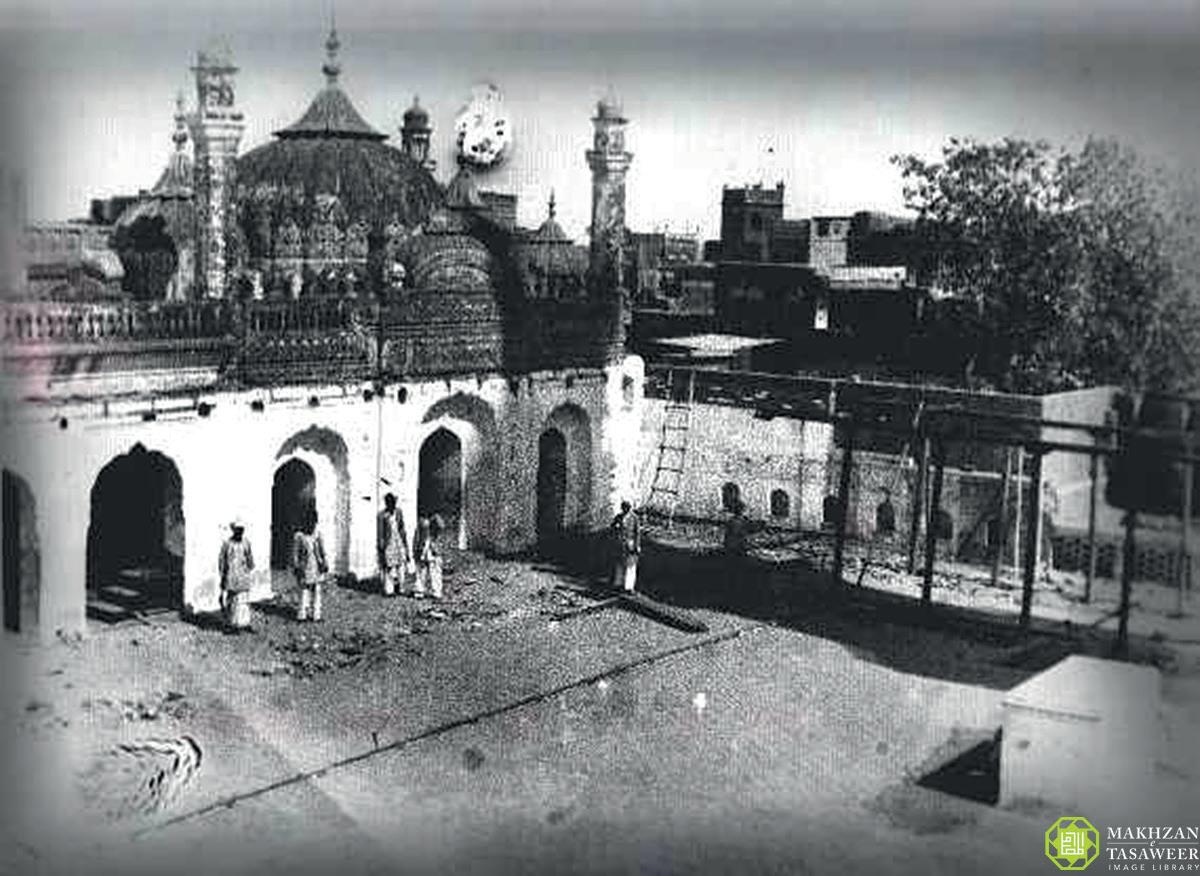
Masjid Aqsa, Qadian
upon a nation, its focus turns away from religion. As the Muslims are on the decline nowadays and they are facing problems one aft er the other, their attention has no longer remained on Islam. Th ey have become completely bereft of Islam and have forgotten the teachings of Islam. Everything I have told you is the teaching of Islam.
Professor Sahib: I consider you a holy man and my heart is full of respect for you. I request you, not with any bad intention, but to increase my knowledge, and I will be very grateful if you could give me the reference of what you have said about getting another chance.
Hazrat Khalifatul Masih: Most certainly, we will provide you its reference with pleasure, but it is too late now (as the call to Maghrib prayer had been made). Th at reference will be sent to you in the morning.
Aft er this discussion, Professor Sahib got up to leave. Hazrat Khalifatul Masih II[ra] also stood up and the professor bent before him with great reverence, paid respect and left .
Th e said reference was sent to him the very next day. We are citing that reference below for the benefi t of the people: دم�م انﺛ :لاﻗ ،یلع��ا دﺒع نبدم�م انﺛدح ،ةریرہ یبأ نع ،ةداتﻗ نع ،رمعم نع ،روﺛ نب كراﺒت هللا �مﺟ ،ﺔمايقلا موی نا� اذا :لاﻗ و ة��ﻔلا یف اوتام نیﺬلا مسنلا یلاعت و نیﺬلا خويشلا و ،مكب��ا و مص��ا و هوتعملا ا�وسر لسرأ مﺛ ،اوفرﺧ دﻗ و مالسا�ا ءاﺟ انتﺄی ملو ﻒيك :نولوقيف ،رانلا ا��ﺧدا نأ ادرب ��يلع تﻧا�� اہ��ﺧد ول هللا میاو !لوسر نا� نم هعيﻄيف ،��يلا لسری مﺛ ،امالس و نا اوءرﻗا :ةریرہ وبأ لاﻗ ۔لﺒﻗ هعيﻄی نأ دیری ا�وسر ﺚعﺒﻧ یتح ��بﺬعم ان� ام و :��ﺌﺷ
“On the Day of Judgment, Allah the Almighty will gather the souls of those people who died on fi trah [nature], and those who were mentally ill, deaf and dumb, and also those who, when Islam came, were so old that they had lost their memory due old age.
“Th en a messenger will be sent to them [saying], ‘Enter the Fire.’ Th ey will say, ‘No messenger has been sent to us, so why should we enter the Fire?’ By God, if they had entered the Fire, it would have become cold and a means of safety for them.
“Th en, He will send a Messenger among them and only those of them who had the intention to obey him before will obey him.” Hazrat Abu Hurairahra said, “If you want [proof of the said interpretation], then read [the verse], ‘We never punish until We have sent a Messenger.’” (Tafsir alTabari by Muhammad ibn Jarir, Juz‘ 14, pp. 526-527, Ch.17: V.16)
(Translated by Al Hakam from the original Urdu in the 27 January 1921 issue of Al Fazl)
Seerat-un-Nabi Jalsas in USA
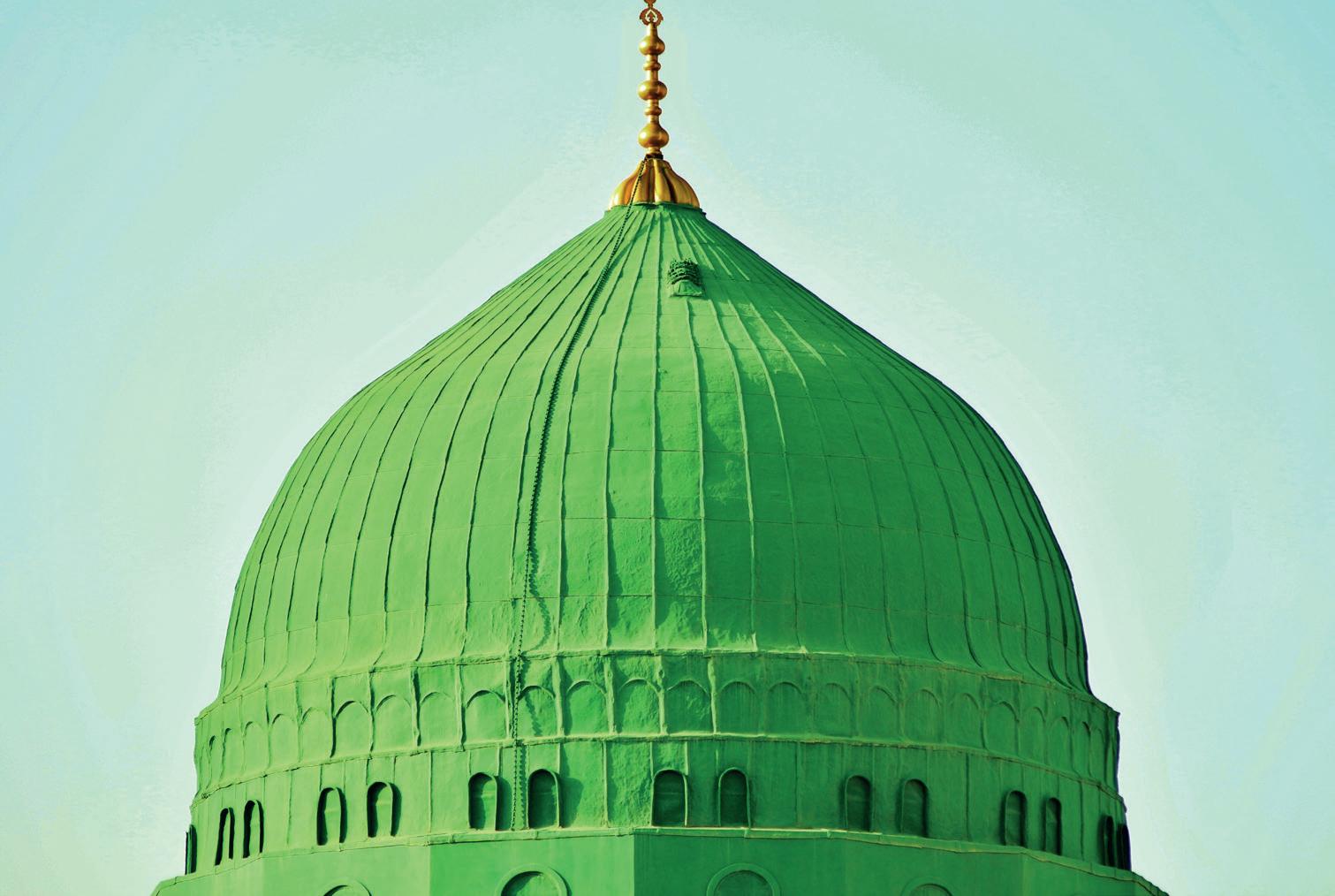
Syed Shamshad Nasir Missionary, USA
Rafi Malik Sahib, President Jamaat Columbus, reports that the Columbus Jamaat held its annual “Seerat-un-Nabi” Jalsa on 24 January 2021 via Zoom — commemorating the true character of the Holy Prophet Muhammadsa .
Th e event started with a recitation of the Holy Quran followed by a poem in praise of the Holy Prophetsa. Th e president of the Columbus Jamaat, Rafi Malik Sahib, moderated the session.
In his opening remarks, he explained the signifi cance and purpose of holding the Seerat-un-Nabi programmes, saying that these events were held to remember and appreciate the true character of the Holy Prophetsa and to remind ourselves how he conducted himself and dealt with friends and foes, the poor and the needy and led by example in every aspect of life. Th is great man brought about a revolution in the world.
Naseer Wasim Sahib, in his presentation, spoke about the Holy Prophetsa being merciful in his daily life, highlighting this overarching characteristic towards his relatives, friends, enemies, the poor and needy.
Kamil Salam Sahib related many sayings of the Holy Prophetsa giving insight into various aspects of everyday life. Young children also participated by melodiously singing a poem in the praise of the Holy Prophetsa .
Th e guest speaker, Dr Michael Jenkins, spoke about his interfaith experiences with Muslim communities around the globe and spoke about the signifi cance of such eff orts.
Kamil Salam Sahib, Qaid of the local majlis, read out a few ahadith of the Holy Prophetsa, about taking care of neighbours, friends, orphans and the needy.
In his concluding remarks, Shamshad Nasir Sahib, Regional Missionary, thanked the guests for joining the programme and highlighted the essence of holding the Seerat-un-Nabi programme. He reminded that although there are eff orts everywhere to establish peace, it is not possible to attain peace unless the world recognises and accepts the messiah of this age.
Th ere were 56 individual logins to the Zoom session. Many members called in as family units and the total attendees of the programme is estimated to be over 150.
Detroit Jamaat Jalsa Seeratun-Nabi Jalsa
Muhammad Ahmad Sahib of Detroit reports that their Jamaat held its Jalsa Seerat-un-Nabi on 24 January 2021.
Jalsa Seerat-un-Nabitraditionally is held every year at Masjid Mahmood; however, due the ongoing pandemic, the 2021 Jalsa was held virtually via Zoom.
Th e programme started with a recitation of the Holy Quran with translation, followed by a poem written by the Promised Messiahas in praise of the Holy Prophetsa .
Following the poem, Sadr Jamaat, Maqbool Tahir Sahib delivered the welcome speech and elaborated on the signifi cance and background of the Jalsa Seerat-un-Nabi. He mentioned that its history went back to the time of Hazrat Musleh-e-Maudra .
During that time when there were a lot of false allegations levelled against the character of the Holy Prophetsa and a lot of derogatory material was published, Huzoorra responded by initiating a scheme to hold Seerat-un-Nabi Jalsas across the country to defend the noble personality and character of the Holy Prophetsa .
Sadr Sahib then introduced the programme and invited Dr BK Ahmad Sahib to present his speech, titled “Life and character of the Holy Prophetsa”.
Following this, Sadr Sahib invited Mahmood Aslam Qummar Sahib to present a talk on “Th e Holy Prophet’ssa love for Allah.”
Following this, a poem was recited. Aft er the poem, Mubashar Ahmad Sahib presented a speech on the topic of “Love of the Holy Prophetsa and the importance of durood”.
Next, Usman Mangla Sahib presented his speech titled “Muhammadsa as sadiq and amin”.
A speech titled “Exemplary treatment of the Holy Prophetsa with Children” by Salman Ahmad Sahib, was presented.
Shamshad Nasir Sahib presented his keynote speech and concluding remarks at the end.
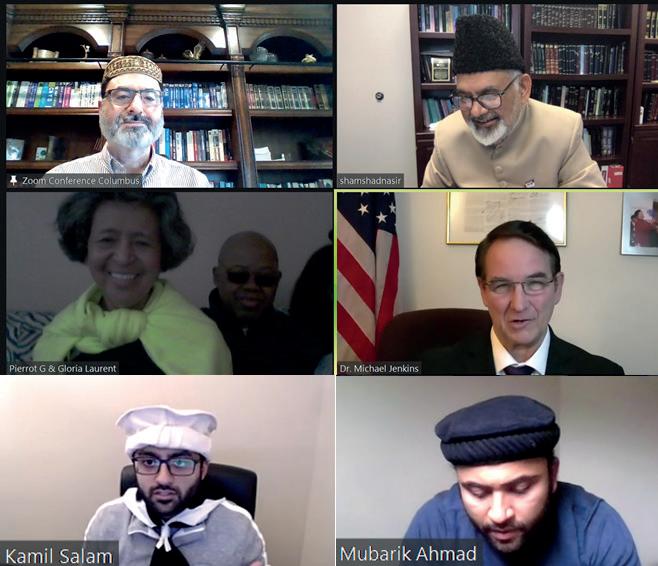

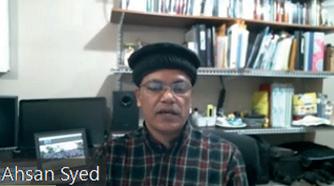

The Holy Prophet Muhammad: Fulfi lling treaties and compacts
Part I
Ataul Mujeeb Rashed Missionary-in-Charge UK
Th e blessed account of the life of Prophet Muhammadsa is sustenance for the soul of a true believer. It freshens one’s faith and revitalises dead hearts. It is the account of that holy personage who has been praised by God of the Th rone Himself. His revered and celebrated name is Muhammadsa ,who lives eternally as an excellent model and spiritual benefi cence.
How beautifully the Promised Messiahas has said:
“God did not desire for anyone to live eternally, but this chosen Prophet lives forever.” (Noah’s Ark, p. 23)
His spiritually quickening eff ect has been giving new life to mankind, as affi rmed by Allah: مکییحی امِل مک اعداذا
“When he calls you that he may give you life” (Surah al-Anfal, Ch.8: V.25)
Undoubtedly, his sacred account will continue to give new spiritual life to mankind till the end of the days. However, this is a reality too:
“One cannot fathom the limit of his sublime status and it is not given to man to estimate the extent of his spiritual eff ectiveness”. (Haqiqat-ul-Wahi – Th e Philosophy of Divine Revelation, pp. 137138)
It is impossible to do justice to his seerat (life).
زا� � ح �درا د� �وا ے� ��� � د� وا ح�
“He is not in need of praise by anyone; one who praises him should take pride in doing so.”
Every aspect of the life of the Holy Prophetsa has an extraordinary grandeur and uniqueness. It always occurs to me that just like a beautiful diamond appears beautiful and attractive from every angle, similarly, rather to a greater extent, every topic of seerat-un-Nabi attracts the hearts in every respect.
Th is article deals with commitment to, and fulfi lment of, compacts and treaties.
Islam is a complete code of conduct for life. It is the divine Shariah that has the most perfect guidance in it, that enlightens every aspect of human life and comprises of teachings that fulfi l all human needs. Islamic teachings pay extraordinary emphasis on commitment to, and fulfi lment of, compacts and treaties: د وقعل اب ا وفوا اونم ا نیذلا اہی ای
“O ye who believe, fulfi l [your] compacts” (Surah al-Maidah, Ch.5: V.2)
“And fulfi l the covenant; for the covenant will be questioned about” (Surah Bani Israel, Ch.17: V.35)
Let us look, in light of historical events, at the matchless example set by our beloved master, Muhammadsa, in the context of commitment to, and fulfi lment of, compacts and treaties.
We see beautiful glimpses of fulfi lment of compacts during the period when he was on the threshold of manhood. He was known as amin (trustworthy) and sadiq (truthful). Both these titles have a deep and fundamental relation with fulfi lment of covenants. Sadiq and sadooq is used for the one whose whole life is entirely free of falsehood. Amin is one whose every statement and deed is inextricably blended with truth and honesty. Both these attributes go hand in hand with commitment to fulfi lment of compacts.
Th e fact that Meccans called him by these names long before he claimed prophethood proves that Allah the Almighty had deposited the quality of fulfi lment of compacts in his soul in such a way that it became an inseparable part of his being. And we see its beautiful manifestations throughout his life.
During his early adulthood, some noble-minded young men set up an organisation called Hilf al-Fudhul – League of the Virtuous. All its members gave an undertaking that they would always resist the oppressor and help the victims.
When the amin and sadooq of Mecca, the young Muhammadsa heard of this, he gladly joined. Only God knows whether any other member of this association was ever called upon to discharge the undertaking or not. However, as divine wisdom would have it, our Perfect Guidesa who was always true to his words, got the opportunity to fulfi l this pledge. He honoured this pledge more than anyone else, during his youth and later throughout his life. Whenever he was called upon to fulfi l the pledge, he would stand up boldly in support of the oppressed. As an example, I present a beautiful event that is preserved in detail in the annals of history:
A man from the Arash tribe came to Mecca to sell his camels. A chief of Mecca, Abu Jahl, bought a camel from him, but as for payment, he wavered. When the trader failed to get the money, he approached the Quraish and cried out for help of the chiefs of Mecca. It was the duty of the members of the Hilf al-Fudhul association to redress his grievances. However, none of them had the courage to approach the oppressor, Abu Jahl, to exhort him to pay the poor trader what was due to him.
One of the chiefs, out of mischief, suggested that he should approach Muhammadsa; “He will help you get your rights”. Th e chief knew very well that Abu Jahl was the worst enemy of the Holy Prophetsa and he would never miss an opportunity to persecute and humiliate him.
Th e trader went straight to the Holy Prophetsa who was in the Masjid alHaram at that time. Th e trader narrated his ordeal and invoked Hilf al-Fudhul to help him. And lo! Th e fl ag-bearer of truth and faithfulness and guardian of pledges, Muhammadsa, stood up right away in support of the aggrieved person.
Th e chiefs of the Quraish were wonderstruck on seeing this. Th ey got one person to follow him to witness the humiliation of Muhammadsa by Abu Jahl. Humiliation? What humiliation? Th is was the occasion to demonstrate the honour and greatness of our Mastersa .
He went with that man straight to Abu Jahl’s house and knocked at the door. He enquired who it was? “It is me, Muhammad”, he replied and asked him to come out. Abu Jahl came out. Th e Holy Prophetsa said, “Pay this man what you owe him, immediately”. Abu Jahl was dumbfounded by the courage and greatness of the Holy Prophetsa. He said, “Wait, I will bring money for him now”. He went in, brought the money and paid the man in full.
Aft er this incident, the chiefs of Mecca reproved Abu Jahl, telling him that he had been advising them to humiliate Muhammadsa and disobey him, yet he himself had accepted the directive from him, thus making him an honourable man. Abu Jahl replied that they would have done the same in that situation. He told them that he saw two wild camels standing on each side of Muhammadsa and had he refused, the camels would have killed him.
Th is extraordinary divine intervention proves, on the one hand, the divine support that he enjoyed at every step, while on the other, that the Perfect Guide, Hazrat Muhammad Mustafasa put his life and honour on the line to fulfi l his undertakings with great courage and established a great model that is matchless in every respect.
Hazrat Abdullahra bin Ubai al-Hamsa reports another event that took place during that early period.
He stated that once he sold something to Muhammadsa, before he was invested with prophethood. However, he did not hand a part of what he had sold. He told the Holy Prophetsa to stay there as he would go to fetch it from his house. Once home, he forgot all about it. Aft er three days, he remembered his promise, got hold of that thing and returned to the spot that had been appointed for the meeting. He saw that the Holy Prophetsa was there, according to his promise. Th e Prophetsa saw Abdullah and most magnanimously said, “I have been waiting here for you for the last three days” and said no more!
It cannot be inferred from this incident, as recorded by Abi Dawud, that the Holy Prophetsa stayed there continuously for three days and three nights; it can only mean that he went to that spot oft en at suitable times and waited for Abdullah.


